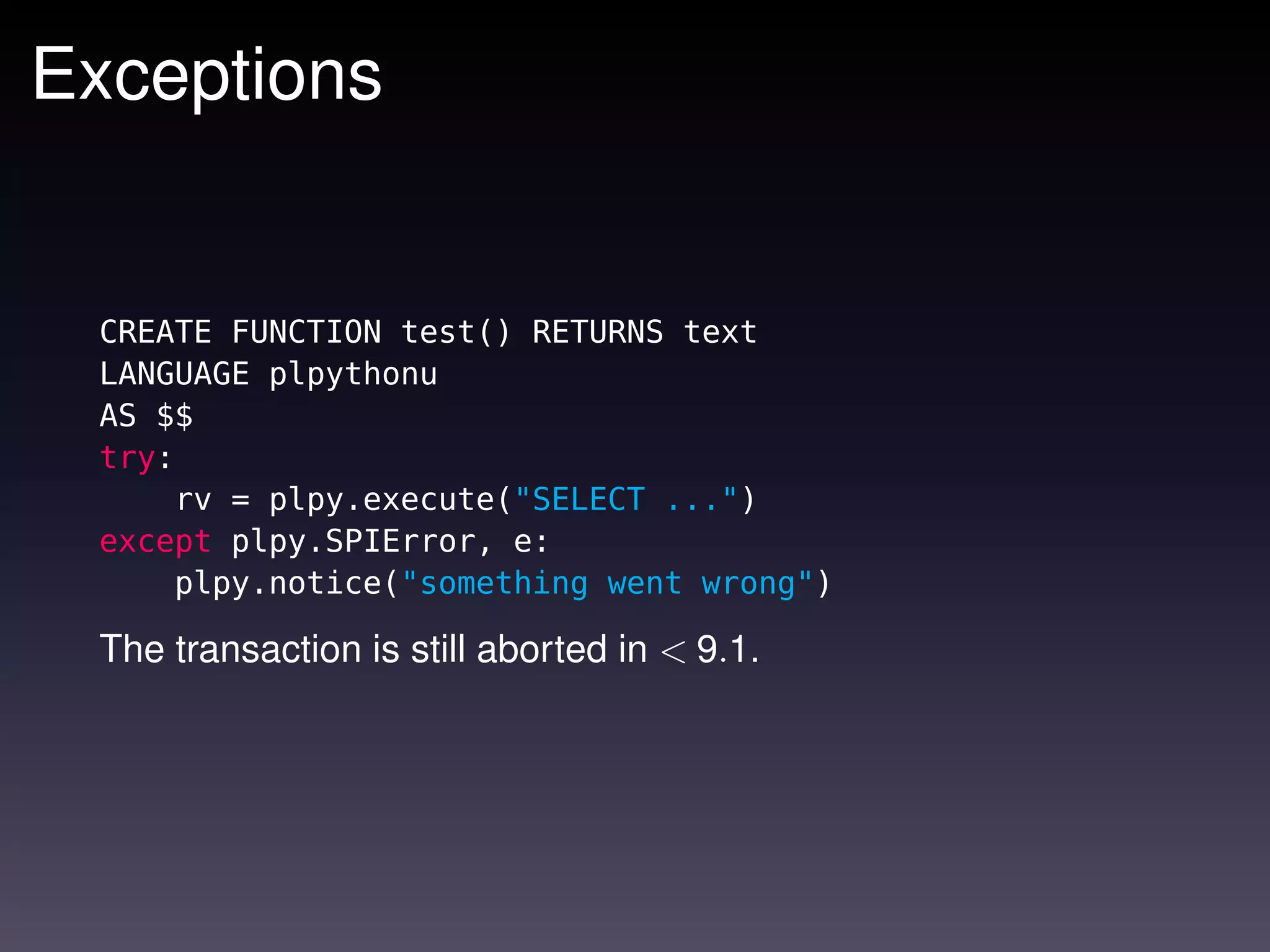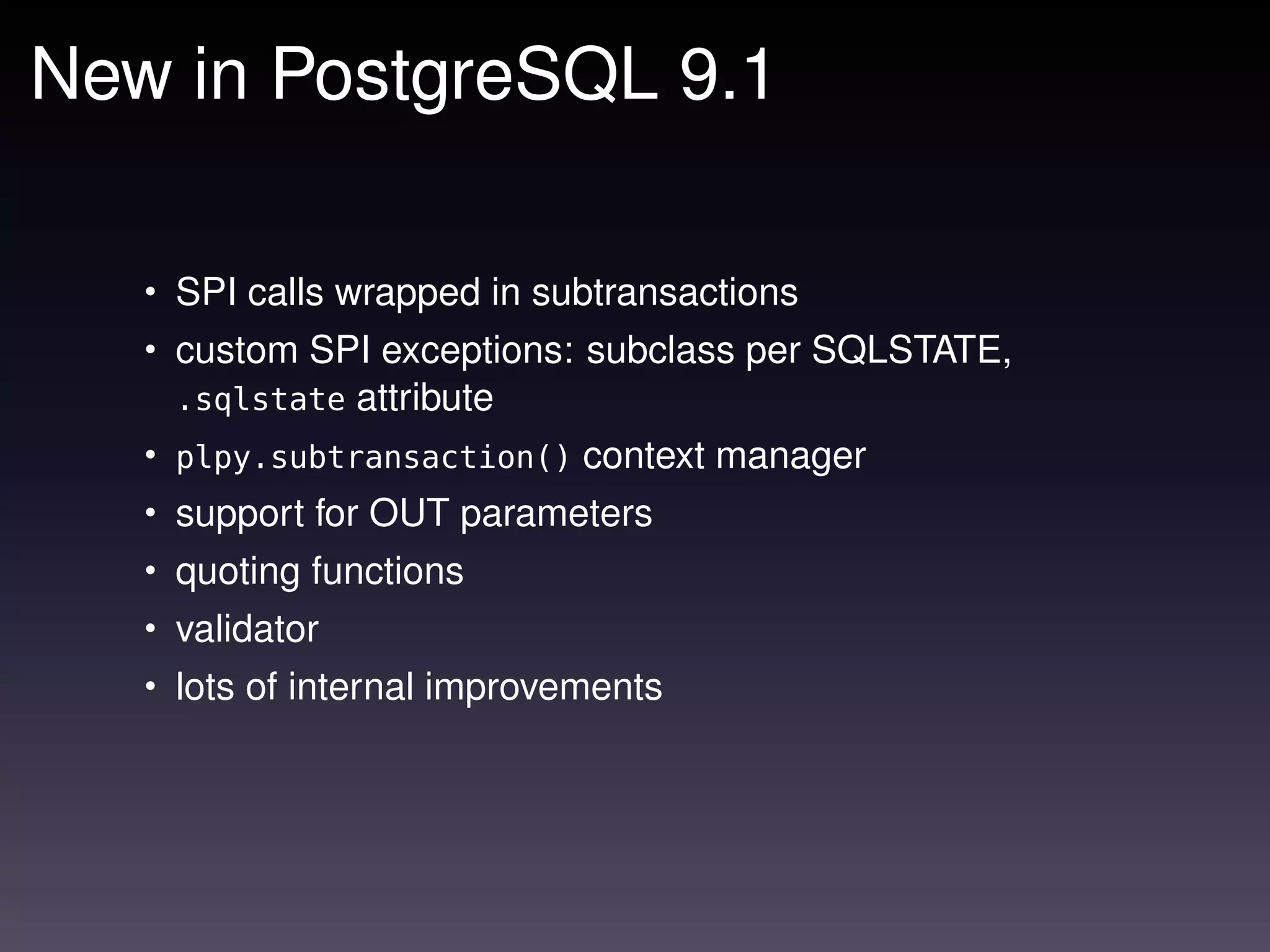This document discusses using Python to connect to and interact with a PostgreSQL database. It covers:
- Popular Python database drivers for PostgreSQL, including Psycopg which is the most full-featured.
- The basics of connecting to a database, executing queries, and fetching results using the DB-API standard. This includes passing parameters, handling different data types, and error handling.
- Additional Psycopg features like server-side cursors, transaction handling, and custom connection factories to access columns by name rather than number.
In summary, it provides an overview of using Python with PostgreSQL for both basic and advanced database operations from the Python side.
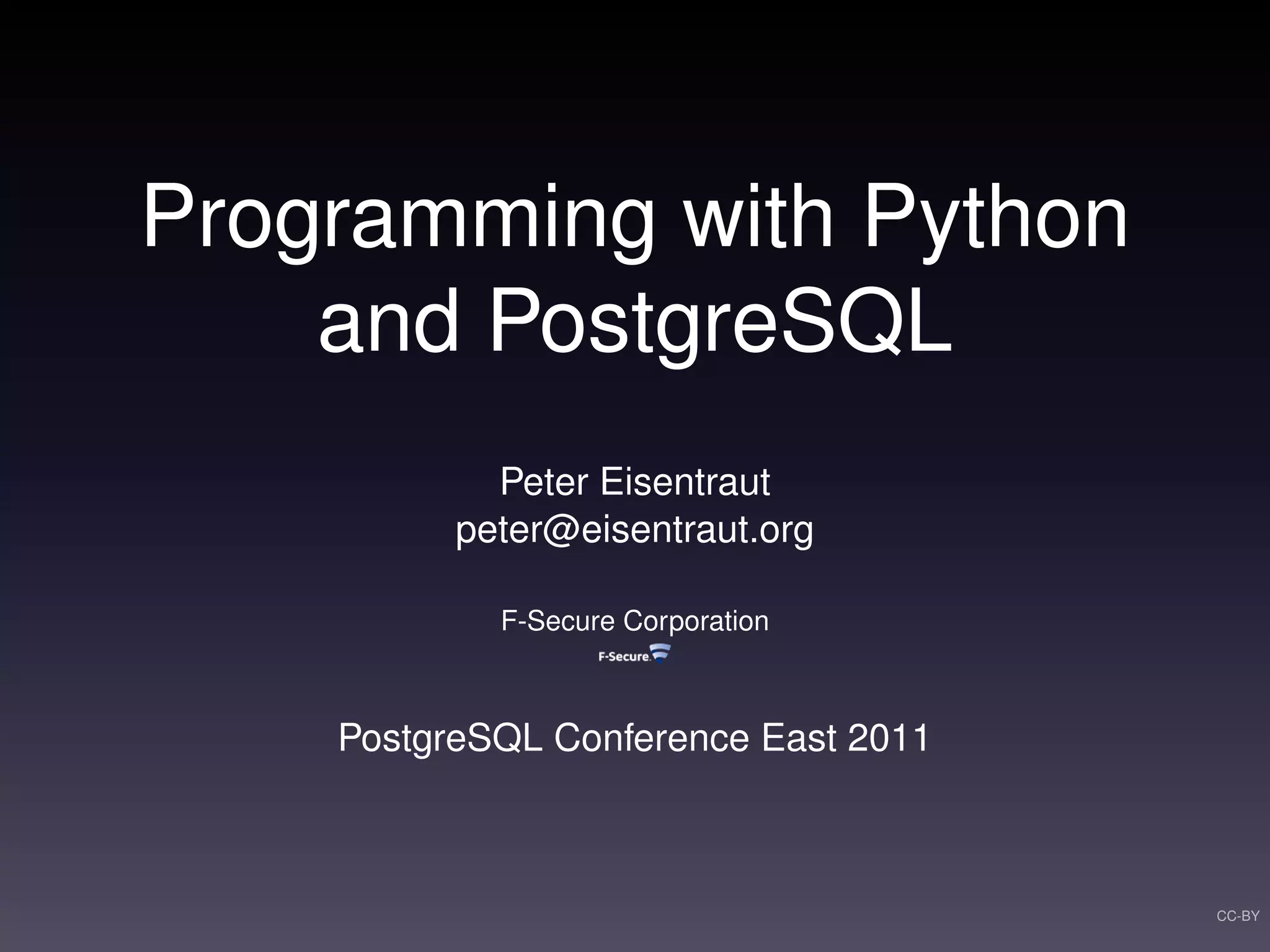
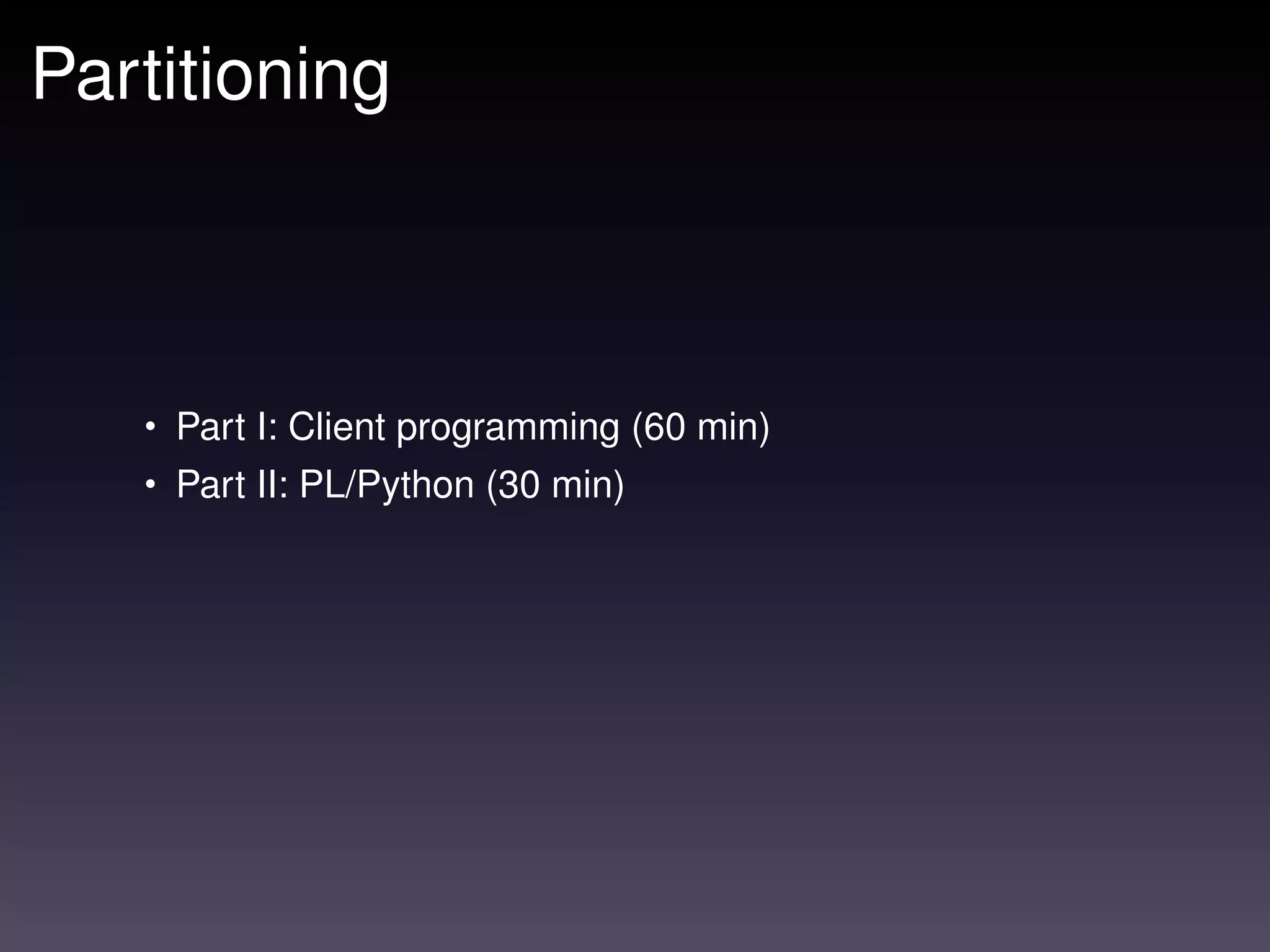

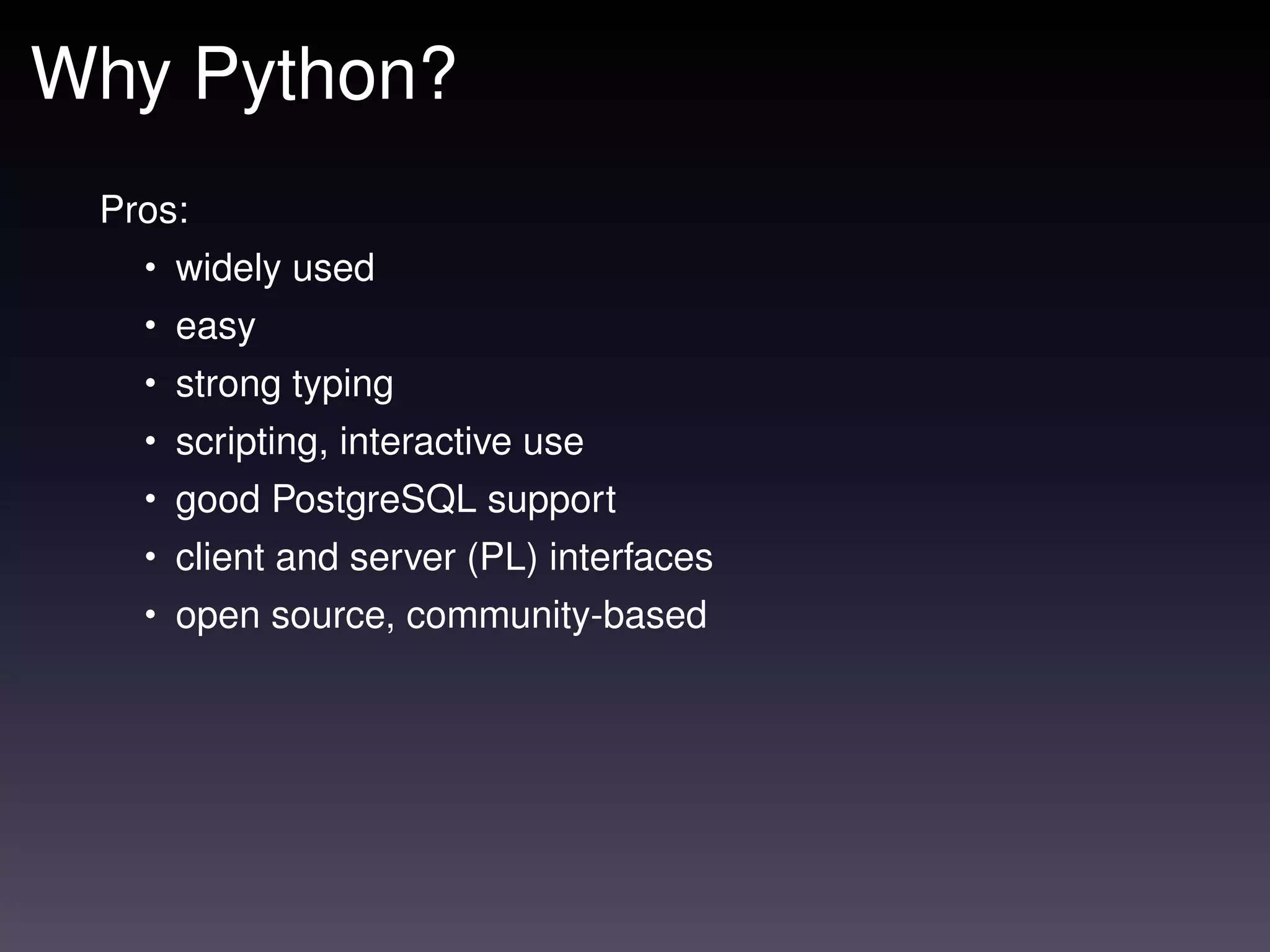
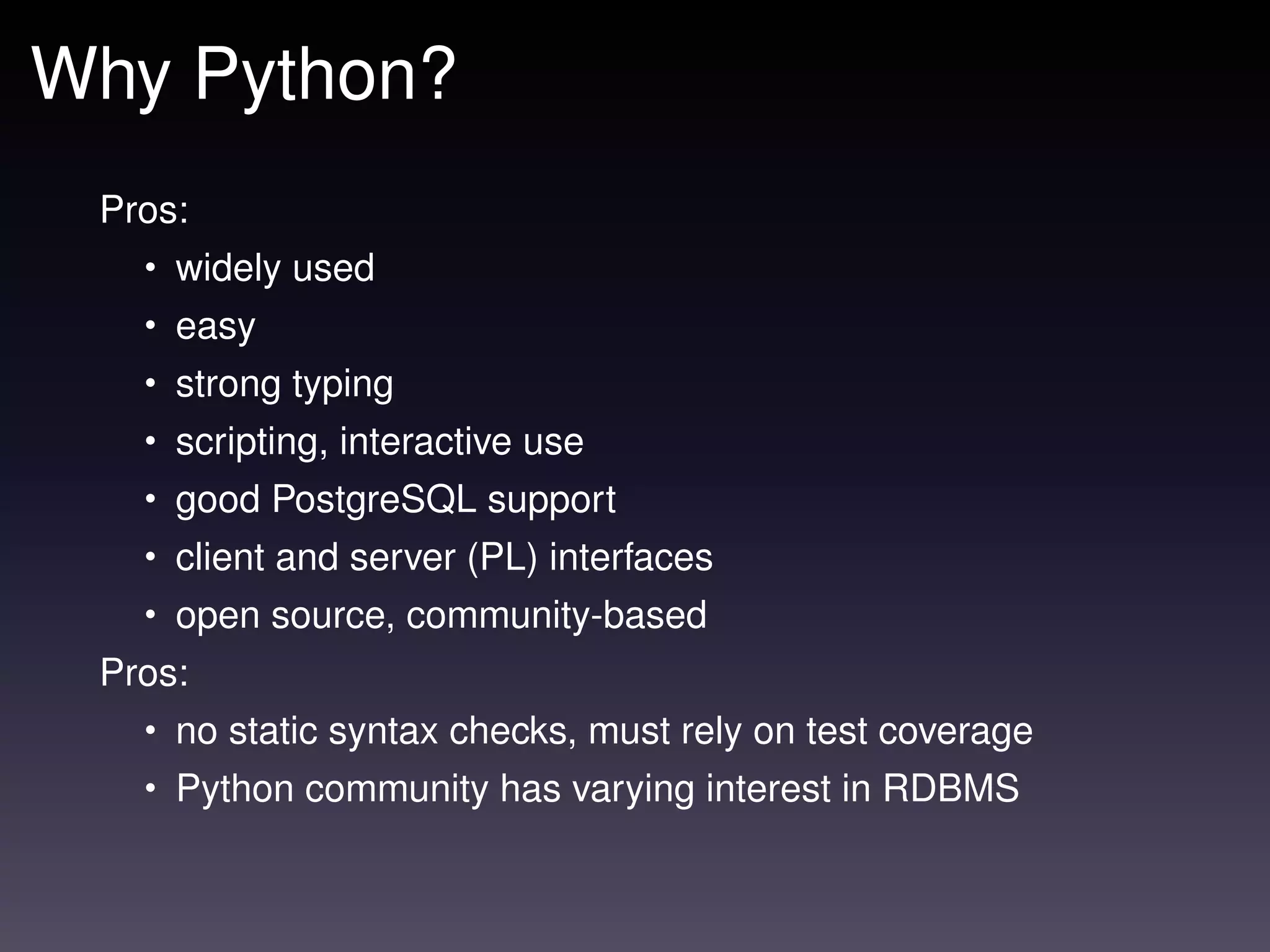
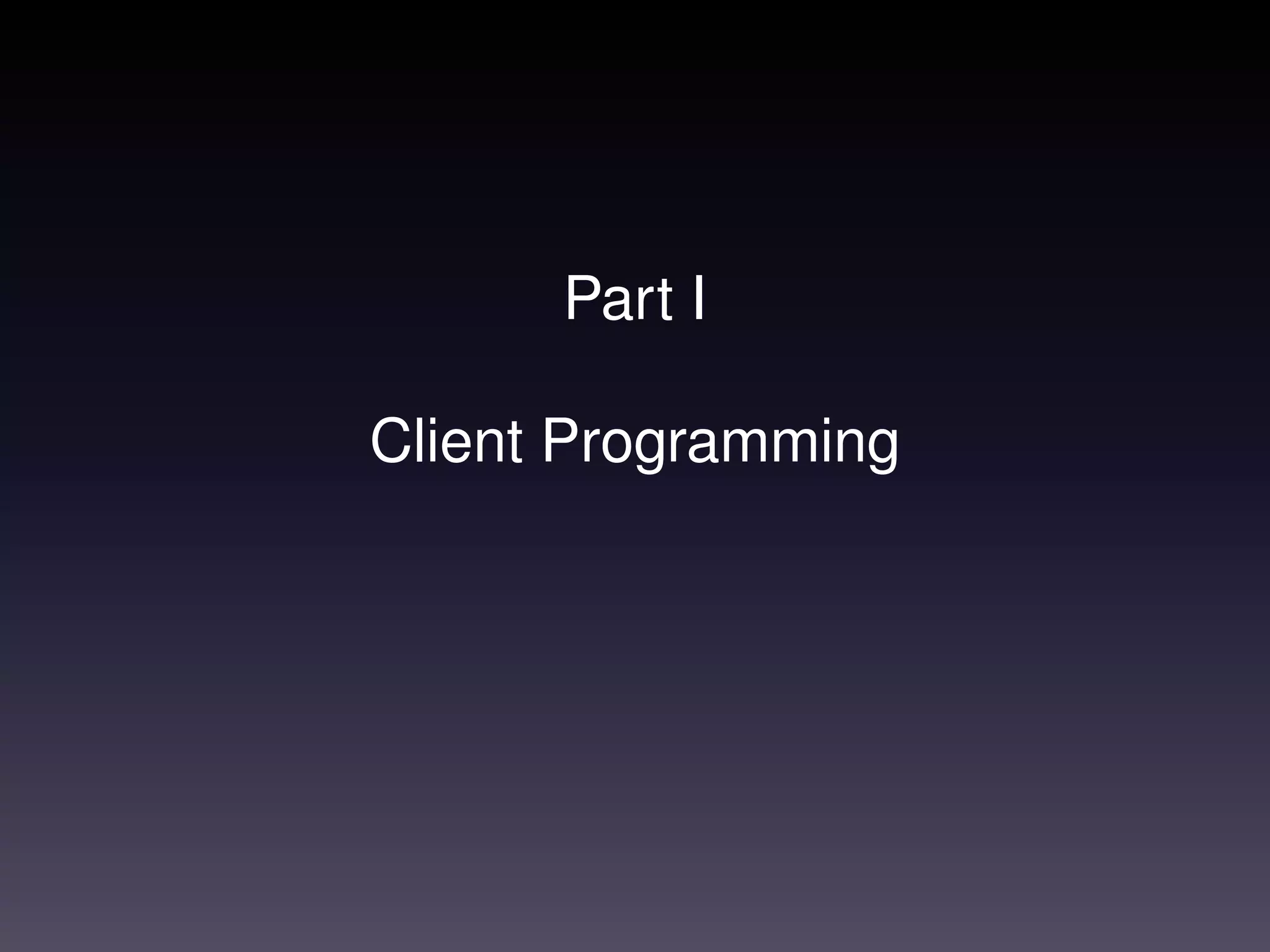
![Example
import psycopg2
dbconn = psycopg2.connect('dbname=dellstore2')
cursor = dbconn.cursor()
cursor.execute("""
SELECT firstname, lastname
FROM customers
ORDER BY 1, 2
LIMIT 10
""")
for row in cursor.fetchall():
print "Name: %s %s" % (row[0], row[1])
cursor.close()
db.close()](https://image.slidesharecdn.com/python-postgresql-110404144126-phpapp02/75/Programming-with-Python-and-PostgreSQL-7-2048.jpg)
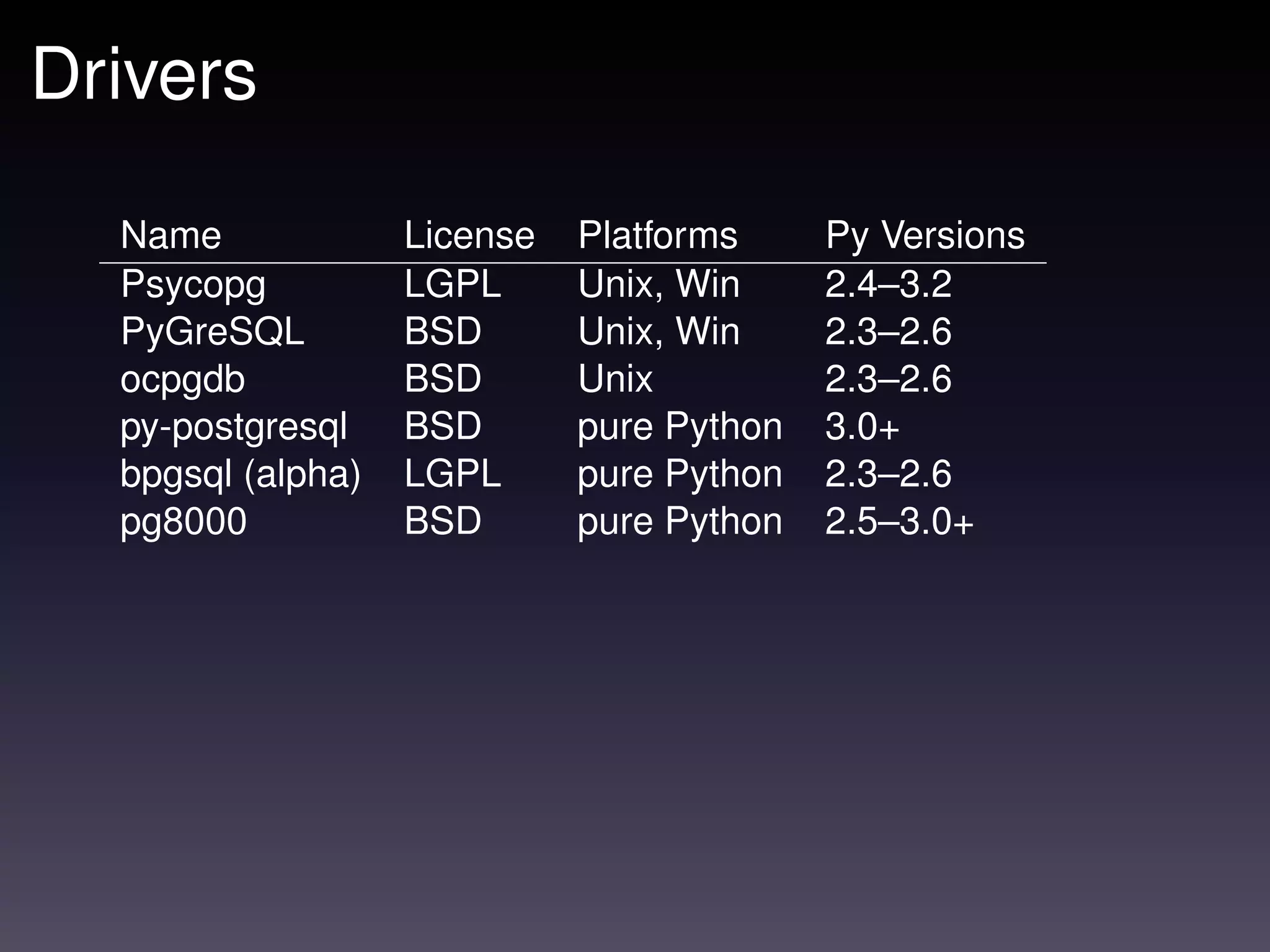
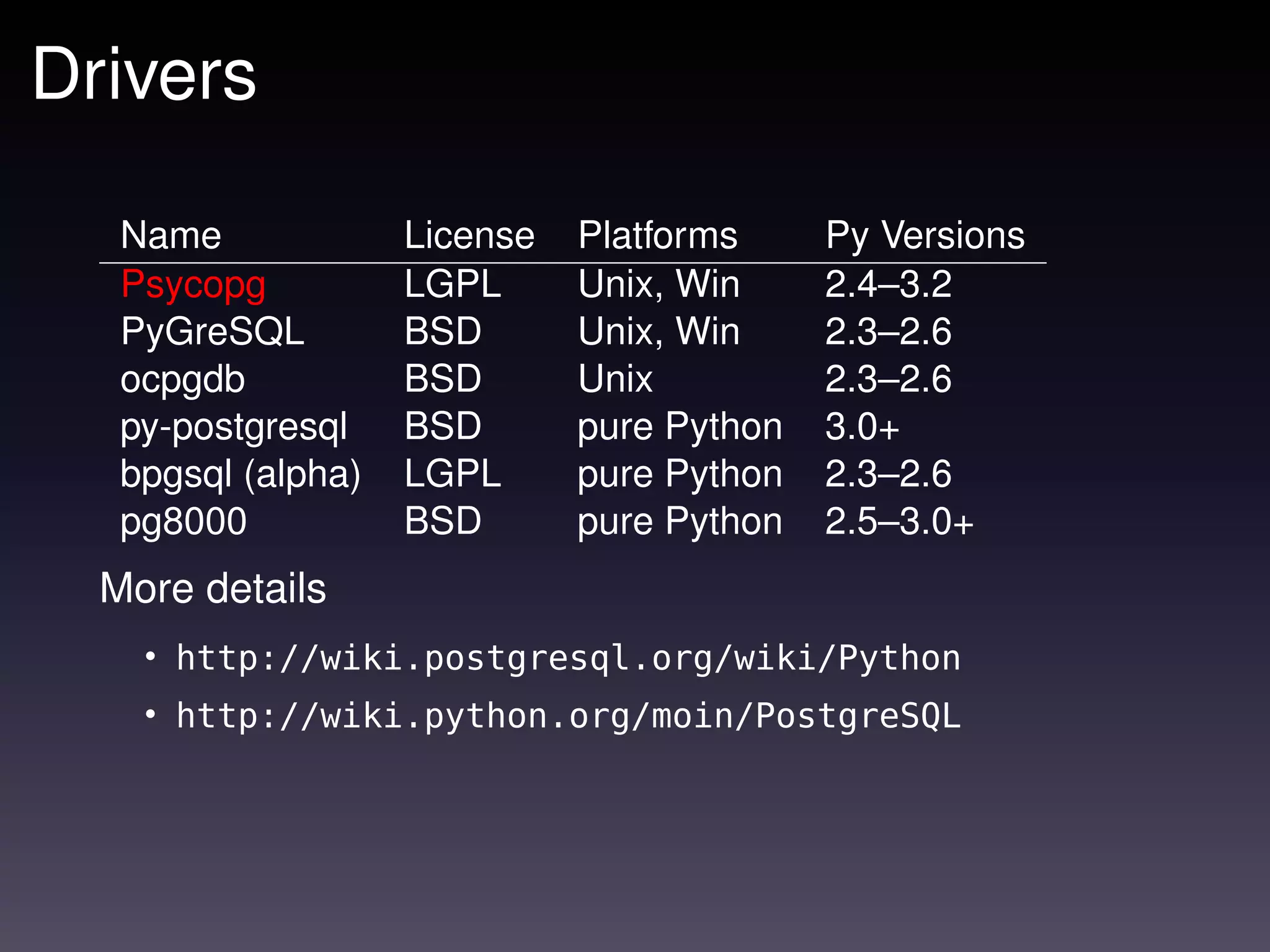
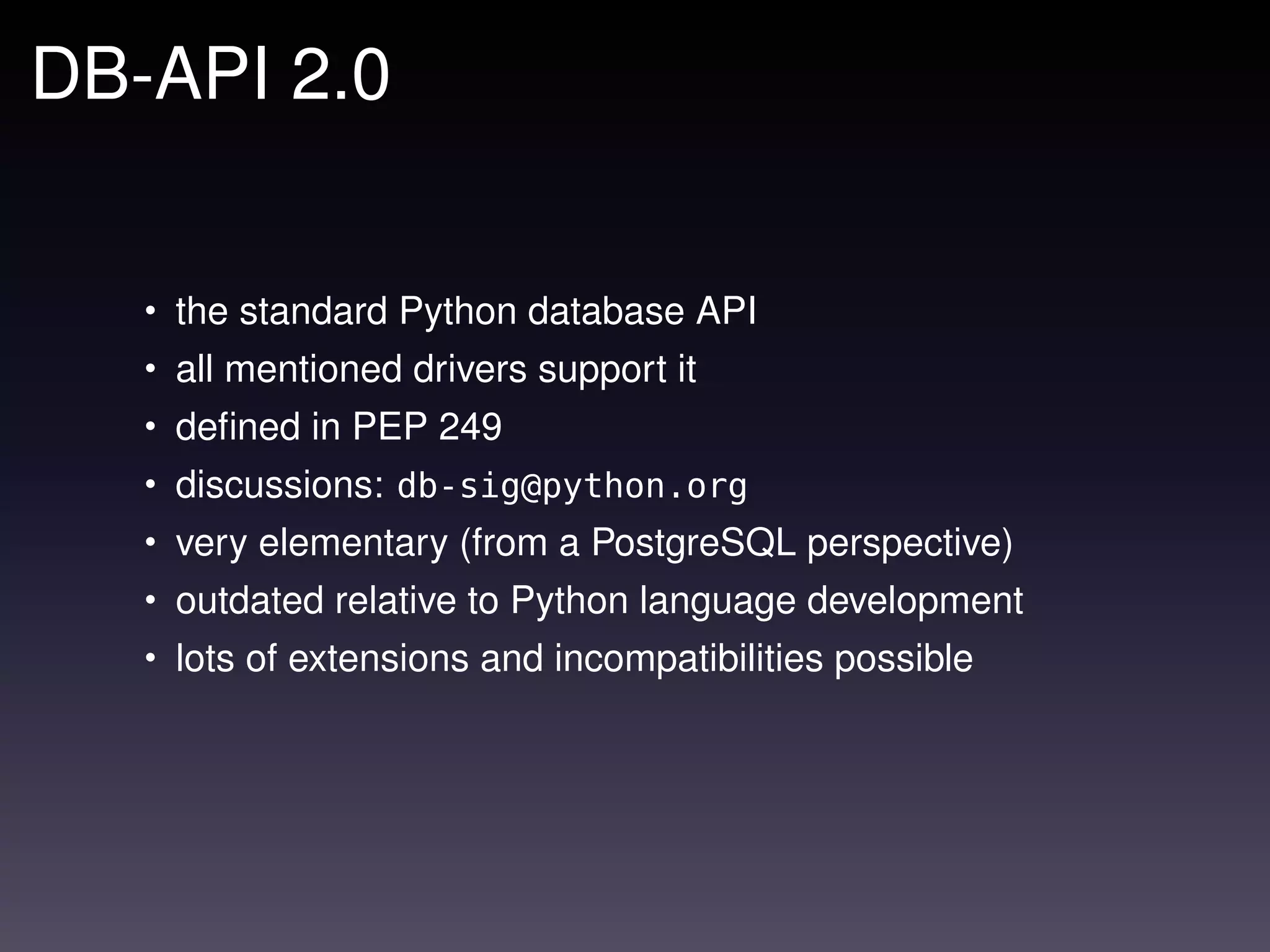


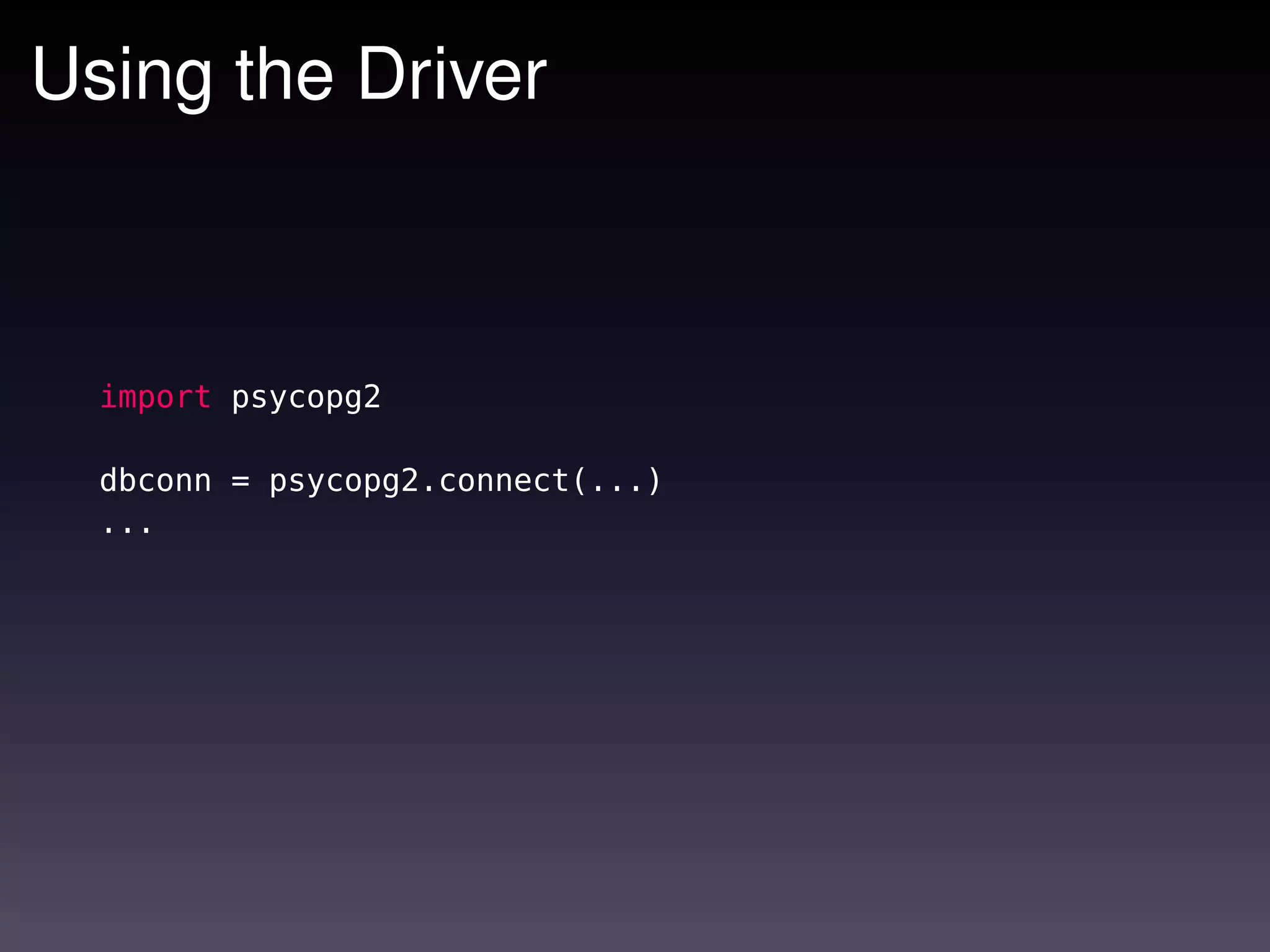
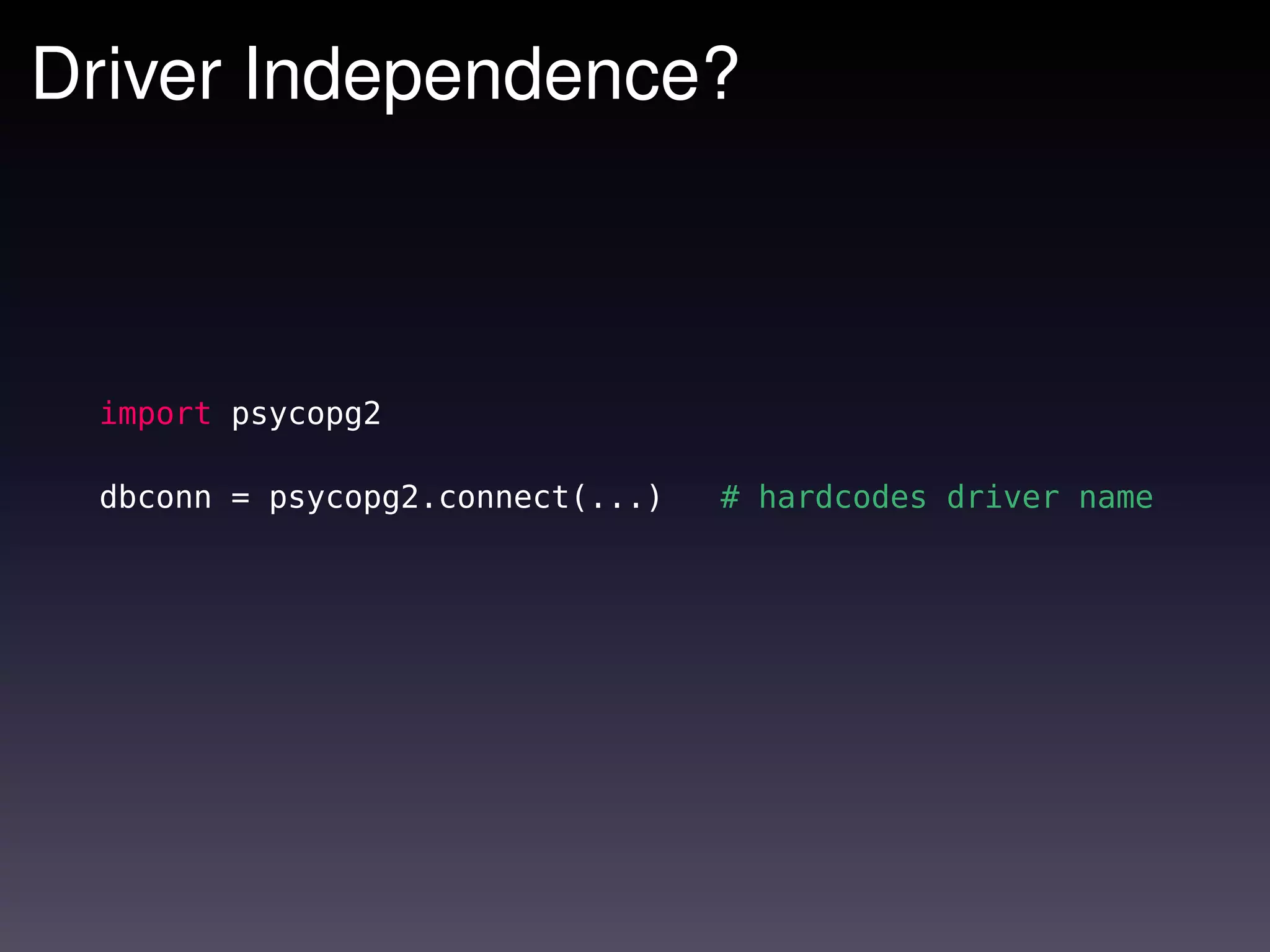
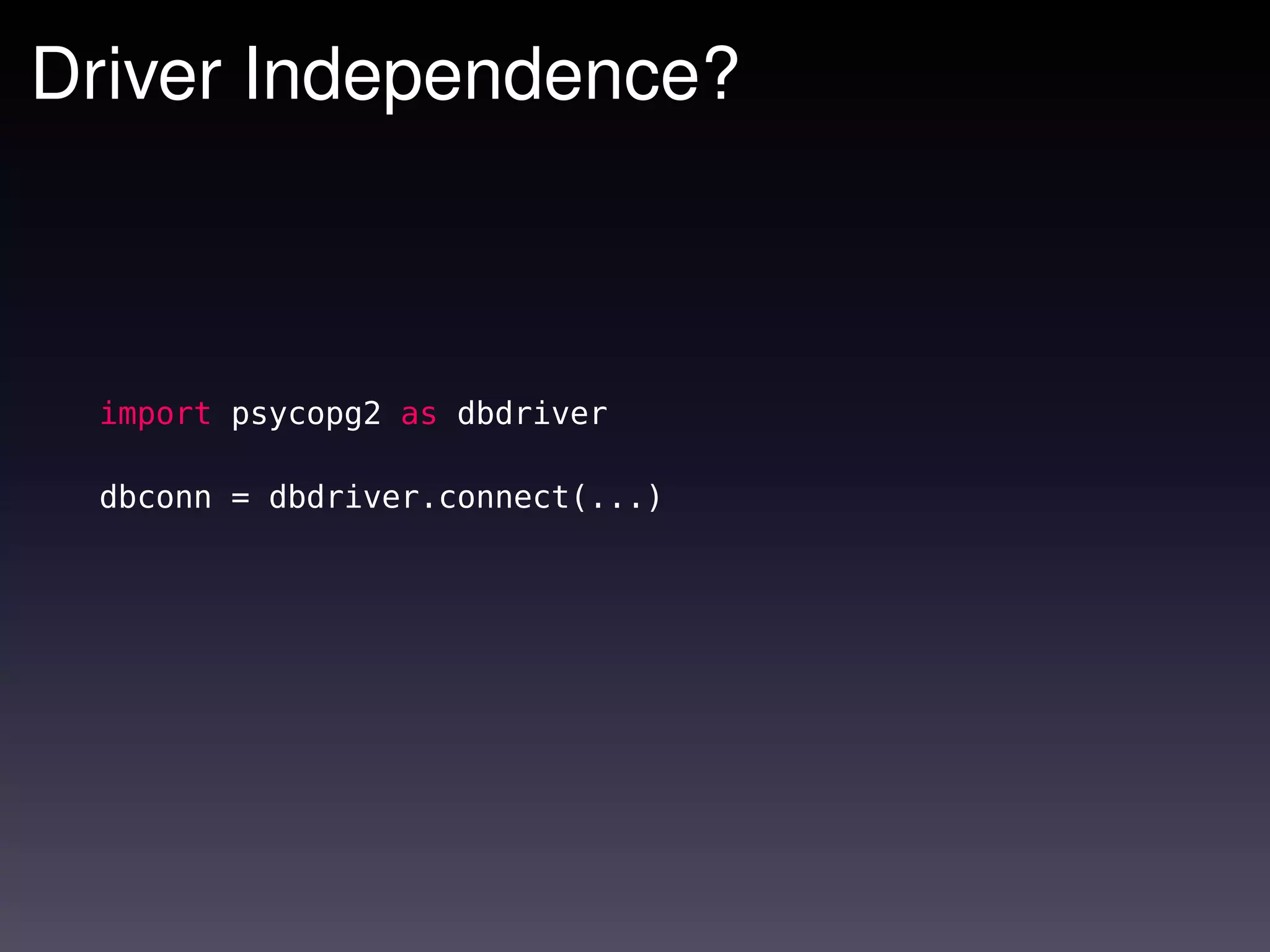
![Driver Independence?
dbtype = 'psycopg2' # e.g. from config file
dbdriver = __import__(dbtype,
globals(), locals(),
[], -1)
dbconn = dbdriver.connect(...)](https://image.slidesharecdn.com/python-postgresql-110404144126-phpapp02/75/Programming-with-Python-and-PostgreSQL-16-2048.jpg)
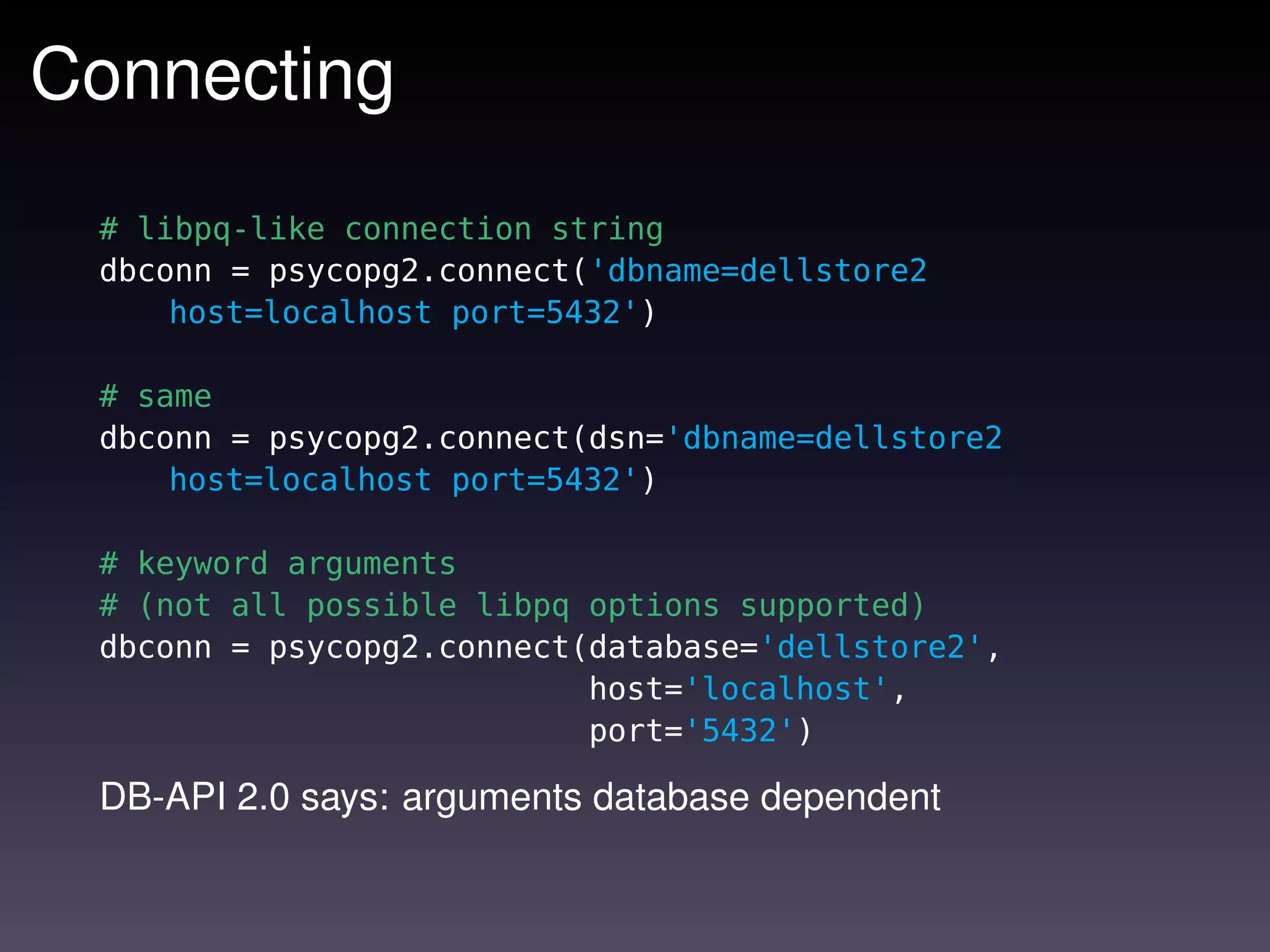
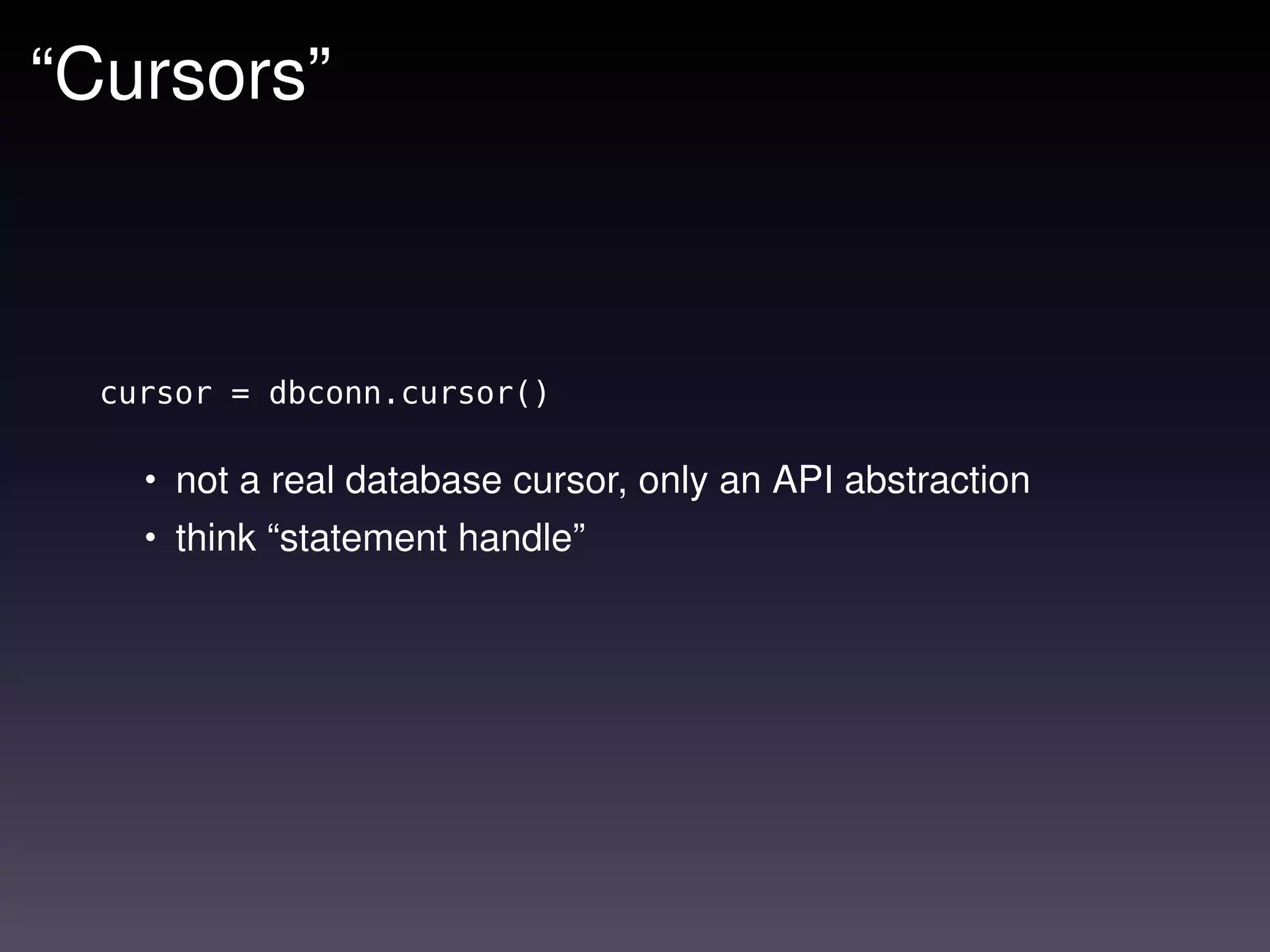
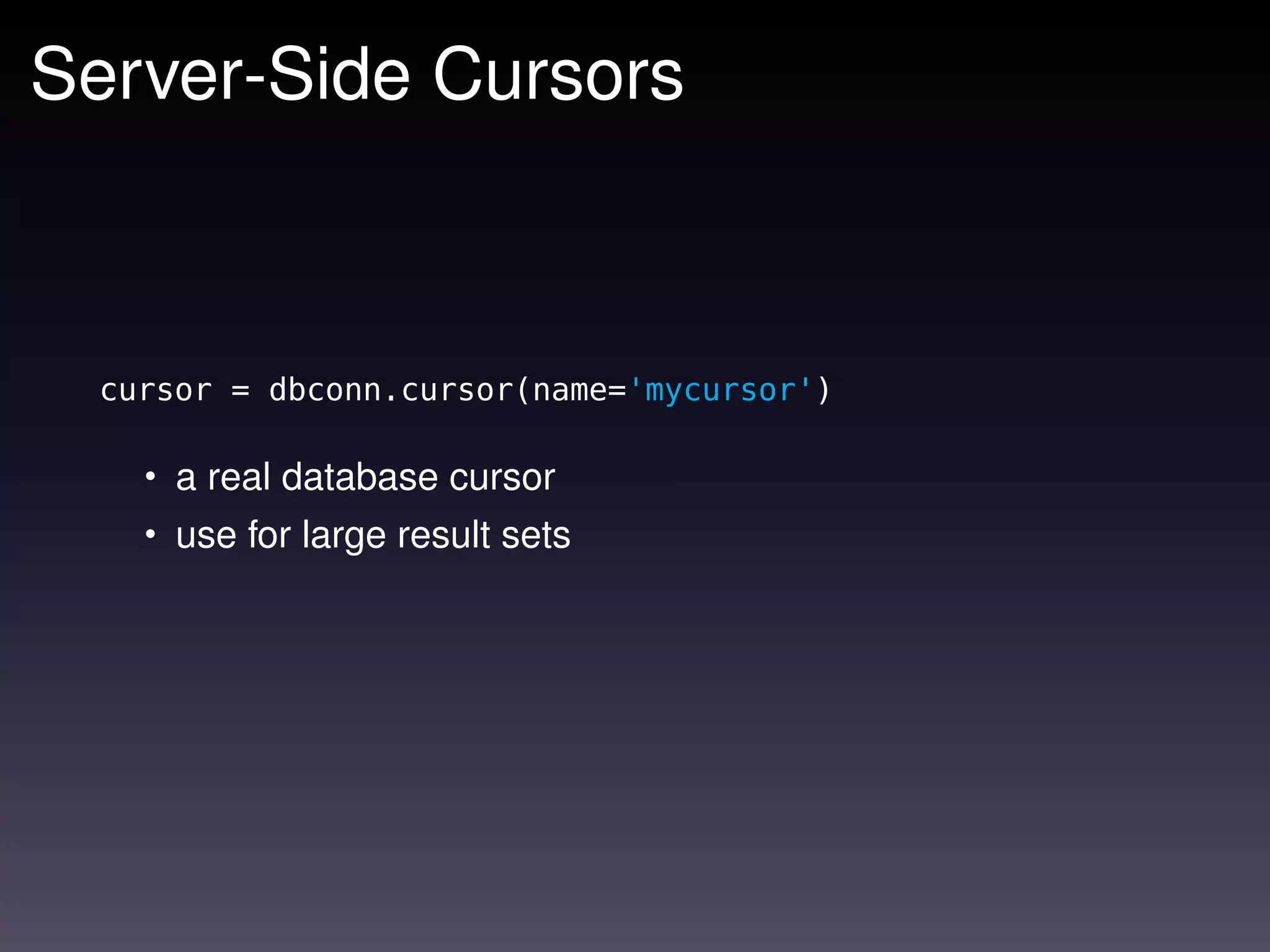
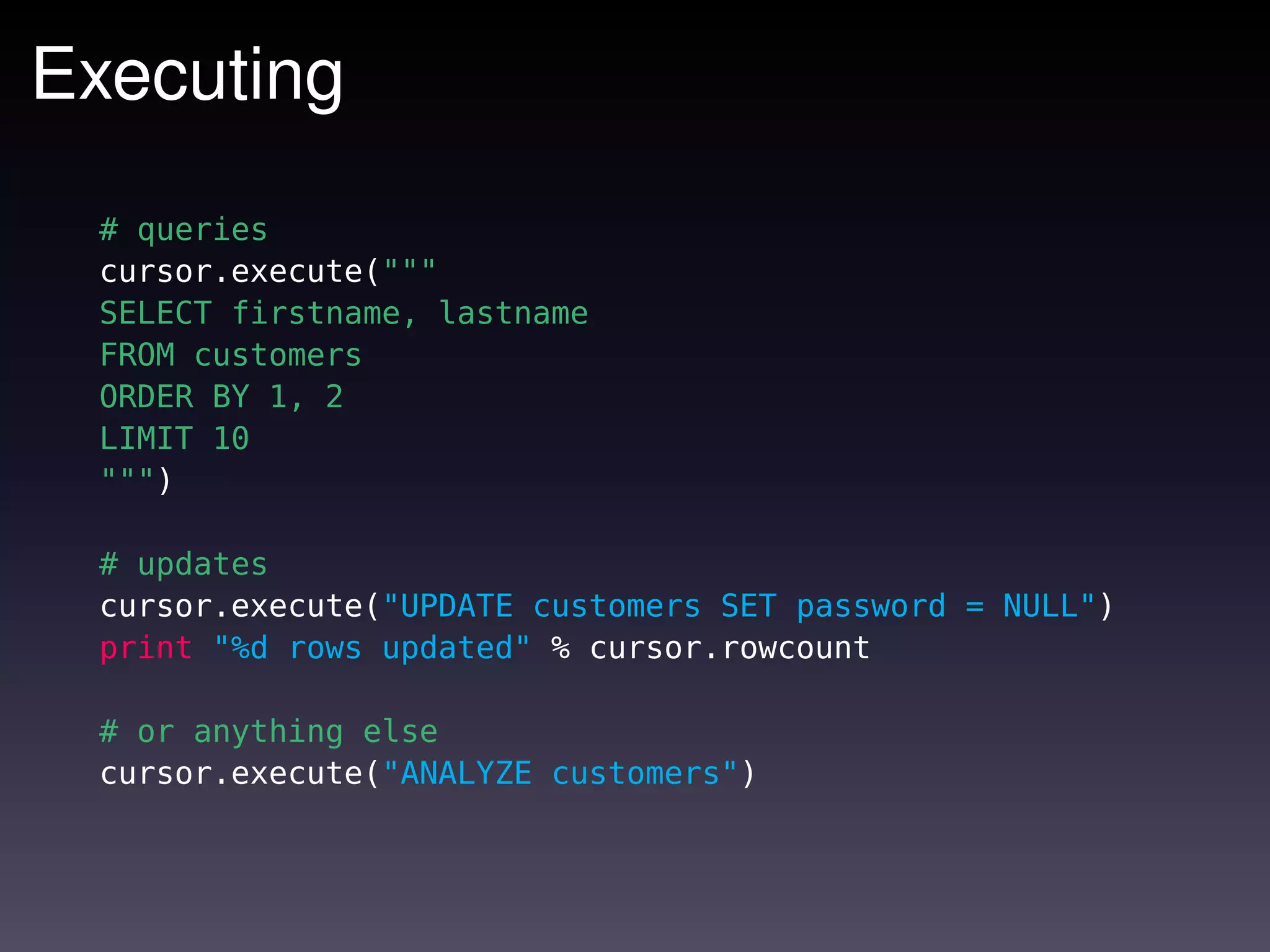
![Fetching Query Results
cursor.execute("SELECT firstname, lastname FROM ...")
cursor.fetchall()
[('AABBKO', 'DUTOFRPLOK'),
('AABTSI', 'ZFCKMPRVVJ'),
('AACOHS', 'EECCQPVTIW'),
('AACVVO', 'CLSXSGZYKS'),
('AADVMN', 'MEMQEWYFYE'),
('AADXQD', 'GLEKVVLZFV'),
('AAEBUG', 'YUOIINRJGE')]](https://image.slidesharecdn.com/python-postgresql-110404144126-phpapp02/75/Programming-with-Python-and-PostgreSQL-21-2048.jpg)
![Fetching Query Results
cursor.execute("SELECT firstname, lastname FROM ...")
for row in cursor.fetchall():
print "Name: %s %s" % (row[0], row[1])](https://image.slidesharecdn.com/python-postgresql-110404144126-phpapp02/75/Programming-with-Python-and-PostgreSQL-22-2048.jpg)
![Fetching Query Results
cursor.execute("SELECT firstname, lastname FROM ...")
for row in cursor.fetchall():
print "Name: %s %s" % (row[0], row[1])
Note: field access only by number](https://image.slidesharecdn.com/python-postgresql-110404144126-phpapp02/75/Programming-with-Python-and-PostgreSQL-23-2048.jpg)
![Fetching Query Results
cursor.execute("SELECT firstname, lastname FROM ...")
row = cursor.fetchone()
if row is not None:
print "Name: %s %s" % (row[0], row[1])](https://image.slidesharecdn.com/python-postgresql-110404144126-phpapp02/75/Programming-with-Python-and-PostgreSQL-24-2048.jpg)
![Fetching Query Results
cursor.execute("SELECT firstname, lastname FROM ...")
for row in cursor:
print "Name: %s %s" % (row[0], row[1])](https://image.slidesharecdn.com/python-postgresql-110404144126-phpapp02/75/Programming-with-Python-and-PostgreSQL-25-2048.jpg)
![Fetching Query Results in Batches
cursor = dbconn.cursor(name='mycursor')
cursor.arraysize = 500 # default: 1
cursor.execute("SELECT firstname, lastname FROM ...")
while True:
batch = cursor.fetchmany()
break if not batch
for row in batch:
print "Name: %s %s" % (row[0], row[1])](https://image.slidesharecdn.com/python-postgresql-110404144126-phpapp02/75/Programming-with-Python-and-PostgreSQL-26-2048.jpg)
![Fetching Query Results in Batches
cursor = dbconn.cursor(name='mycursor')
cursor.execute("SELECT firstname, lastname FROM ...")
cursor.itersize = 2000 # default
for row in cursor:
print "Name: %s %s" % (row[0], row[1])](https://image.slidesharecdn.com/python-postgresql-110404144126-phpapp02/75/Programming-with-Python-and-PostgreSQL-27-2048.jpg)
![Getting Query Metadata
cursor.execute("SELECT DISTINCT state, zip FROM
customers")
print cursor.description[0].name
print cursor.description[0].type_code
print cursor.description[1].name
print cursor.description[1].type_code
state
1043 # == psycopg2.STRING
zip
23 # == psycopg2.NUMBER](https://image.slidesharecdn.com/python-postgresql-110404144126-phpapp02/75/Programming-with-Python-and-PostgreSQL-28-2048.jpg)
![Passing Parameters
cursor.execute("""
UPDATE customers
SET password = %s
WHERE customerid = %s
""", ["sekret", 37])](https://image.slidesharecdn.com/python-postgresql-110404144126-phpapp02/75/Programming-with-Python-and-PostgreSQL-29-2048.jpg)
![Passing Parameters
Not to be confused with (totally evil):
cursor.execute("""
UPDATE customers
SET password = '%s'
WHERE customerid = %d
""" % ["sekret", 37])](https://image.slidesharecdn.com/python-postgresql-110404144126-phpapp02/75/Programming-with-Python-and-PostgreSQL-30-2048.jpg)
![Passing Parameters
cursor.execute("INSERT INTO foo VALUES (%s)",
"bar") # WRONG
cursor.execute("INSERT INTO foo VALUES (%s)",
("bar")) # WRONG
cursor.execute("INSERT INTO foo VALUES (%s)",
("bar",)) # correct
cursor.execute("INSERT INTO foo VALUES (%s)",
["bar"]) # correct
(from Psycopg documentation)](https://image.slidesharecdn.com/python-postgresql-110404144126-phpapp02/75/Programming-with-Python-and-PostgreSQL-31-2048.jpg)
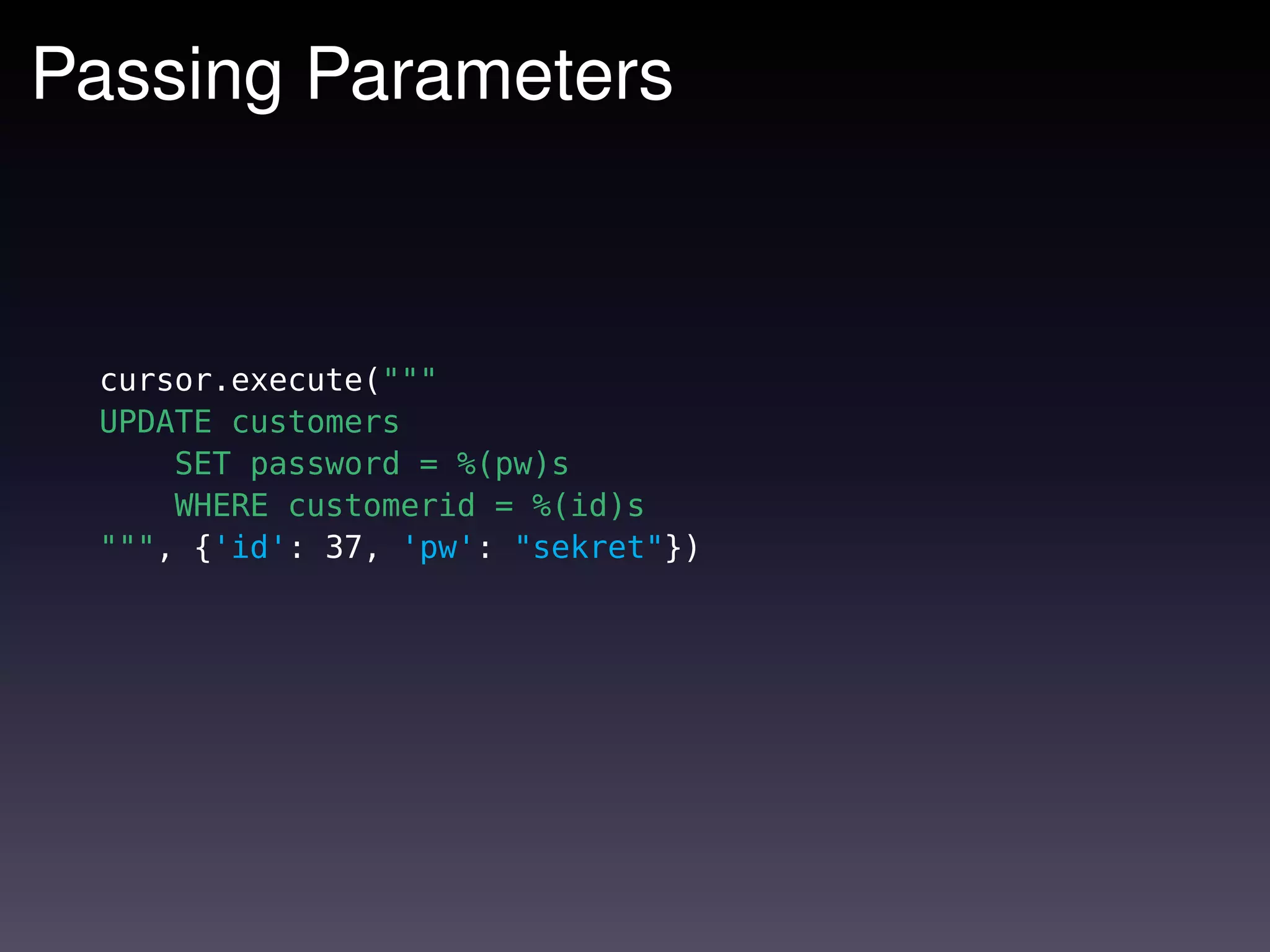
![Passing Many Parameter Sets
cursor.executemany("""
UPDATE customers
SET password = %s
WHERE customerid = %s
""", [["ahTh4oip", 100],
["Rexahho7", 101],
["Ee1aetui", 102]])](https://image.slidesharecdn.com/python-postgresql-110404144126-phpapp02/75/Programming-with-Python-and-PostgreSQL-33-2048.jpg)
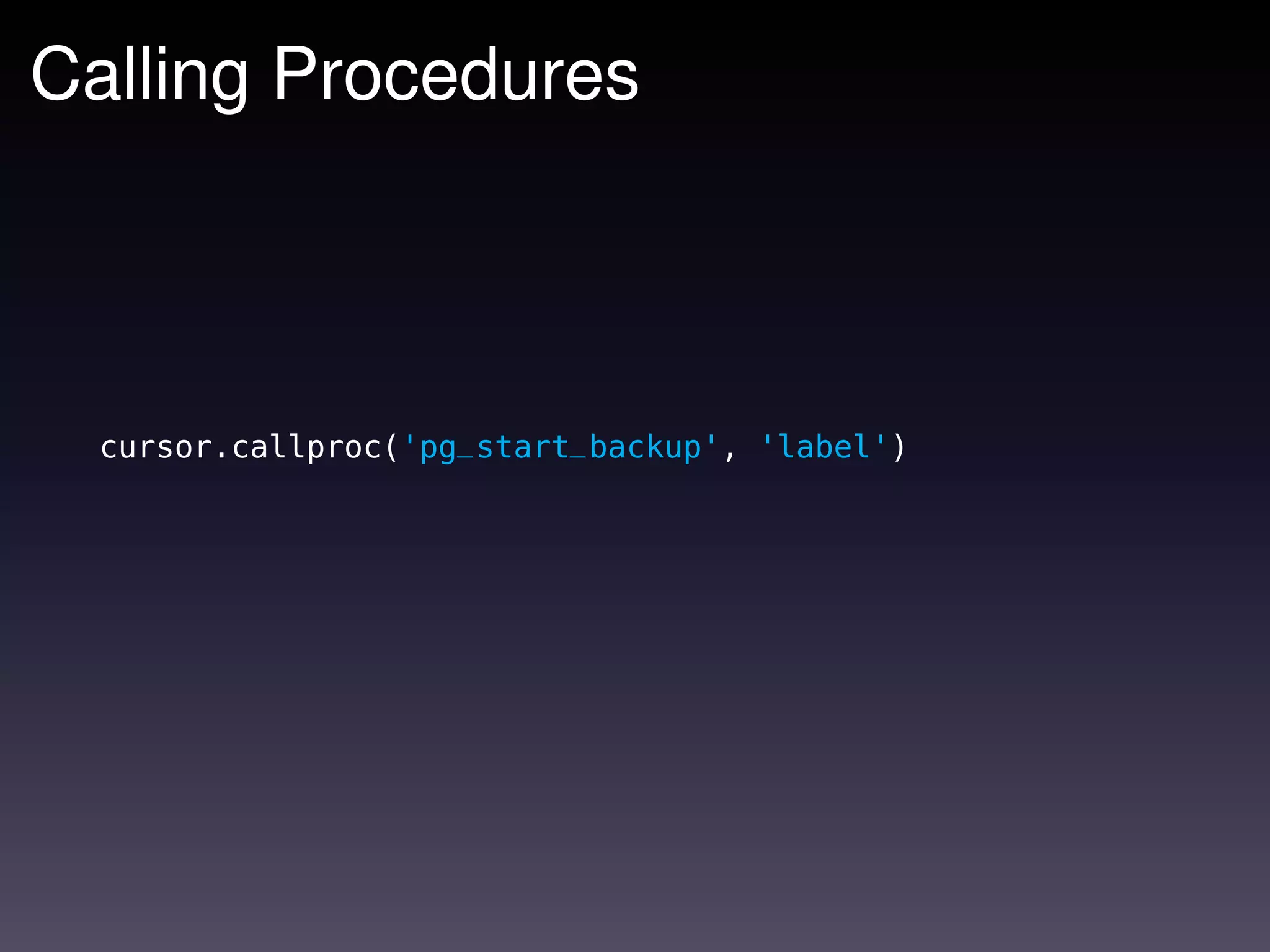
![Data Types
from decimal import Decimal
from psycopg2 import Date
cursor.execute("""
INSERT INTO orders (orderdate, customerid,
netamount, tax, totalamount)
VALUES (%s, %s, %s, %s, %s)""",
[Date(2011, 03, 23), 12345,
Decimal("899.95"), 8.875, Decimal("979.82")])](https://image.slidesharecdn.com/python-postgresql-110404144126-phpapp02/75/Programming-with-Python-and-PostgreSQL-35-2048.jpg)
![Mogrify
from decimal import Decimal
from psycopg2 import Date
cursor.mogrify("""
INSERT INTO orders (orderdate, customerid,
netamount, tax, totalamount)
VALUES (%s, %s, %s, %s, %s)""",
[Date(2011, 03, 23), 12345,
Decimal("899.95"), 8.875, Decimal("979.82")])
Result:
"nINSERT INTO orders (orderdate, customerid,n
netamount, tax, totalamount)nVALUES
('2011-03-23'::date, 12345, 899.95, 8.875, 979.82)"](https://image.slidesharecdn.com/python-postgresql-110404144126-phpapp02/75/Programming-with-Python-and-PostgreSQL-36-2048.jpg)
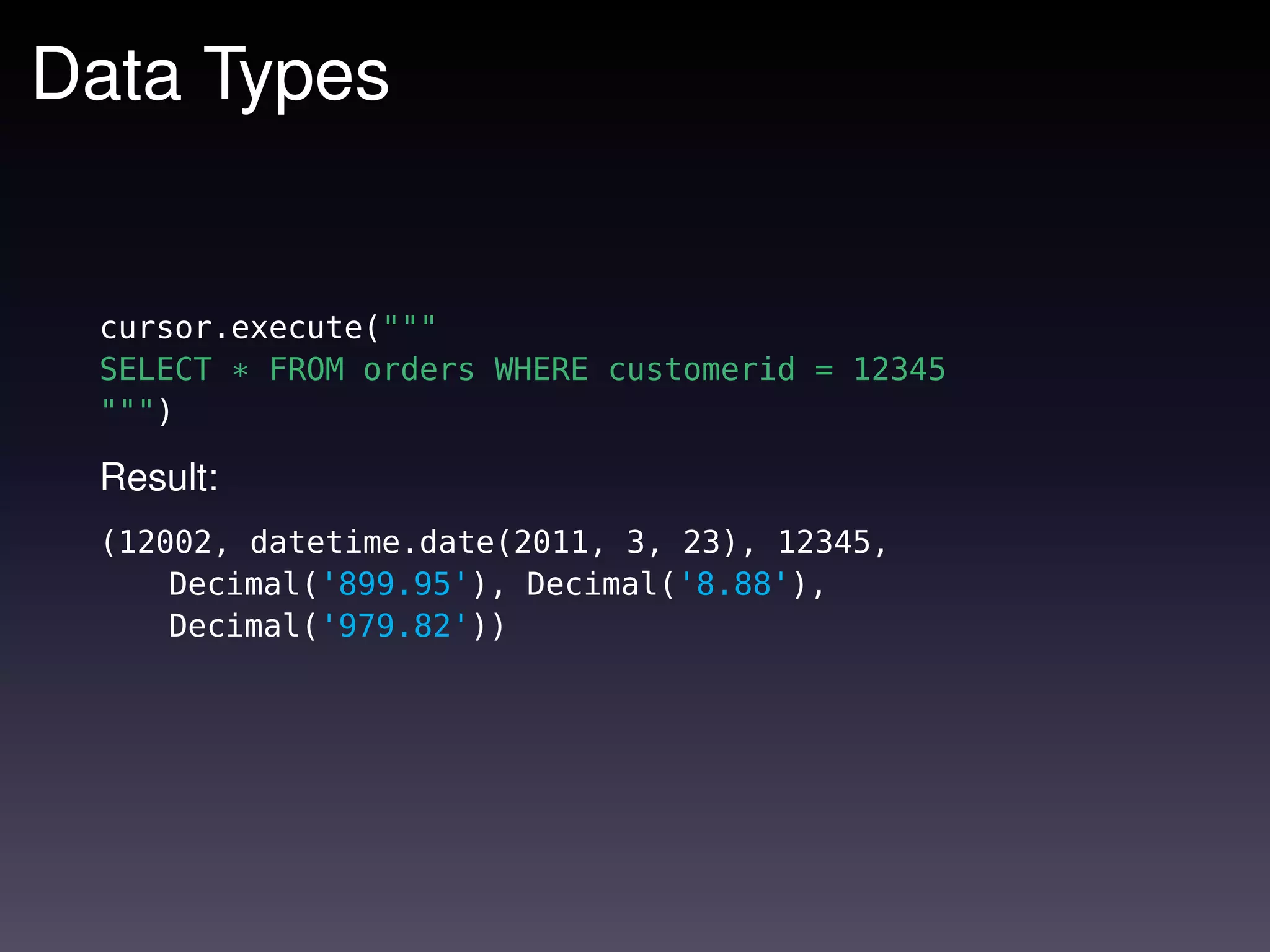
![Nulls
Input:
cursor.mogrify("SELECT %s", [None])
'SELECT NULL'
Output:
cursor.execute("SELECT NULL")
cursor.fetchone()
(None,)](https://image.slidesharecdn.com/python-postgresql-110404144126-phpapp02/75/Programming-with-Python-and-PostgreSQL-38-2048.jpg)
![Booleans
cursor.mogrify("SELECT %s, %s", [True, False])
'SELECT true, false'](https://image.slidesharecdn.com/python-postgresql-110404144126-phpapp02/75/Programming-with-Python-and-PostgreSQL-39-2048.jpg)
![Binary Data
Standard way:
from psycopg2 import Binary
cursor.mogrify("SELECT %s", [Binary("foo")])
"SELECT E'x666f6f'::bytea"](https://image.slidesharecdn.com/python-postgresql-110404144126-phpapp02/75/Programming-with-Python-and-PostgreSQL-40-2048.jpg)
![Binary Data
Standard way:
from psycopg2 import Binary
cursor.mogrify("SELECT %s", [Binary("foo")])
"SELECT E'x666f6f'::bytea"
Other ways:
cursor.mogrify("SELECT %s", [buffer("foo")])
"SELECT E'x666f6f'::bytea"
cursor.mogrify("SELECT %s",
[bytearray.fromhex(u"deadbeef")])
"SELECT E'xdeadbeef'::bytea"
There are more. Check the documentation. Check the versions.](https://image.slidesharecdn.com/python-postgresql-110404144126-phpapp02/75/Programming-with-Python-and-PostgreSQL-41-2048.jpg)
![Date/Time
Standard ways:
from psycopg2 import Date, Time, Timestamp
cursor.mogrify("SELECT %s, %s, %s",
[Date(2011, 3, 23),
Time(9, 0, 0),
Timestamp(2011, 3, 23, 9, 0, 0)])
"SELECT '2011-03-23'::date, '09:00:00'::time,
'2011-03-23T09:00:00'::timestamp"](https://image.slidesharecdn.com/python-postgresql-110404144126-phpapp02/75/Programming-with-Python-and-PostgreSQL-42-2048.jpg)
![Date/Time
Other ways:
import datetime
cursor.mogrify("SELECT %s, %s, %s, %s",
[datetime.date(2011, 3, 23),
datetime.time(9, 0, 0),
datetime.datetime(2011, 3, 23, 9, 0),
datetime.timedelta(minutes=90)])
"SELECT '2011-03-23'::date, '09:00:00'::time,
'2011-03-23T09:00:00'::timestamp, '0 days
5400.000000 seconds'::interval"
mx.DateTime also supported](https://image.slidesharecdn.com/python-postgresql-110404144126-phpapp02/75/Programming-with-Python-and-PostgreSQL-43-2048.jpg)
![Arrays
foo = [1, 2, 3]
bar = [datetime.time(9, 0), datetime.time(10, 30)]
cursor.mogrify("SELECT %s, %s",
[foo, bar])
"SELECT ARRAY[1, 2, 3], ARRAY['09:00:00'::time,
'10:30:00'::time]"](https://image.slidesharecdn.com/python-postgresql-110404144126-phpapp02/75/Programming-with-Python-and-PostgreSQL-44-2048.jpg)
![Tuples
foo = (1, 2, 3)
cursor.mogrify("SELECT * FROM customers WHERE
customerid IN %s",
[foo])
'SELECT * FROM customers WHERE customerid IN (1, 2, 3)'](https://image.slidesharecdn.com/python-postgresql-110404144126-phpapp02/75/Programming-with-Python-and-PostgreSQL-45-2048.jpg)
![Hstore
import psycopg2.extras
psycopg2.extras.register_hstore(cursor)
x = {'a': 'foo', 'b': 'bar'}
cursor.mogrify("SELECT %s",
[x])
"SELECT hstore(ARRAY[E'a', E'b'], ARRAY[E'foo',
E'bar'])"](https://image.slidesharecdn.com/python-postgresql-110404144126-phpapp02/75/Programming-with-Python-and-PostgreSQL-46-2048.jpg)
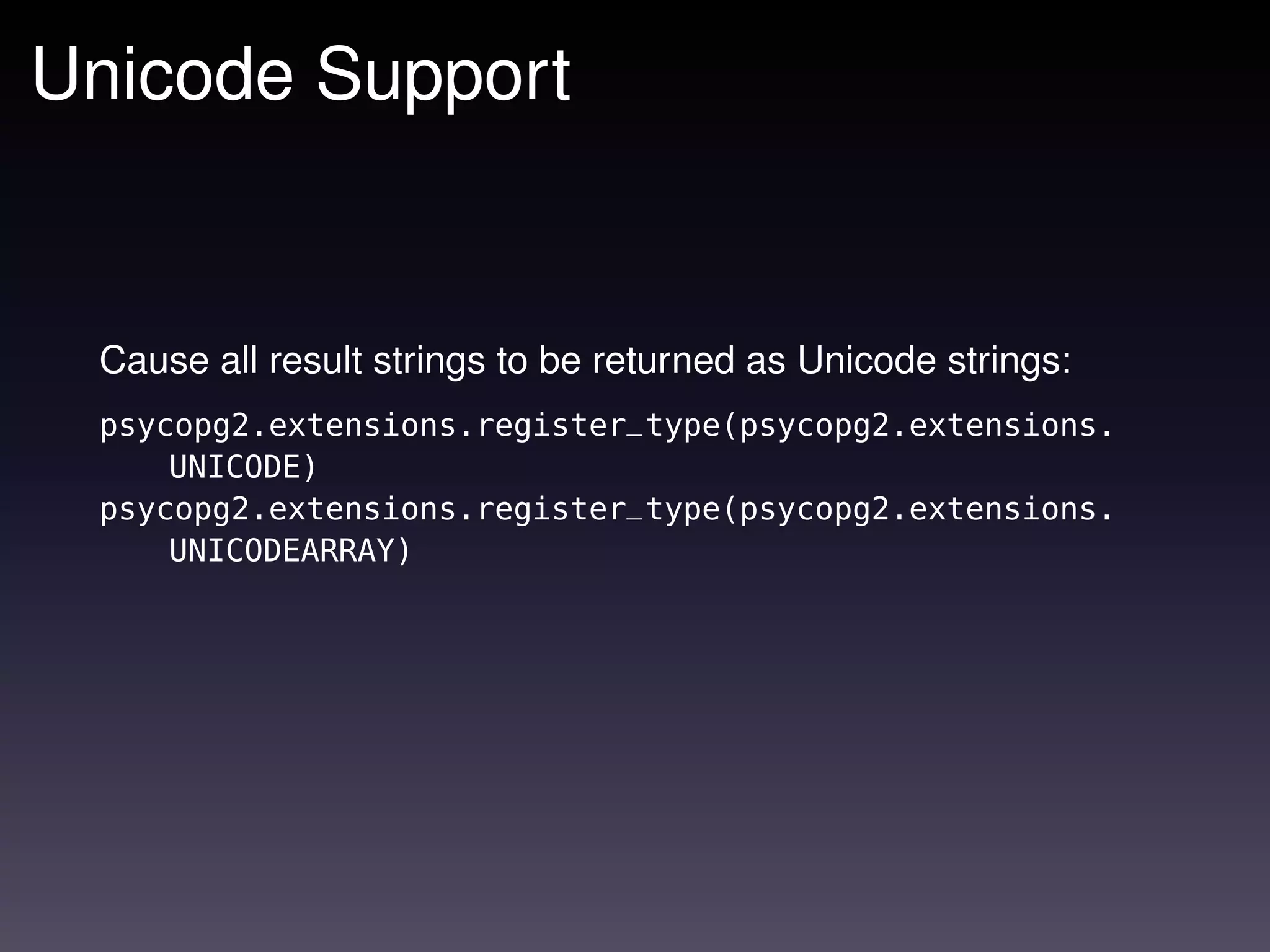
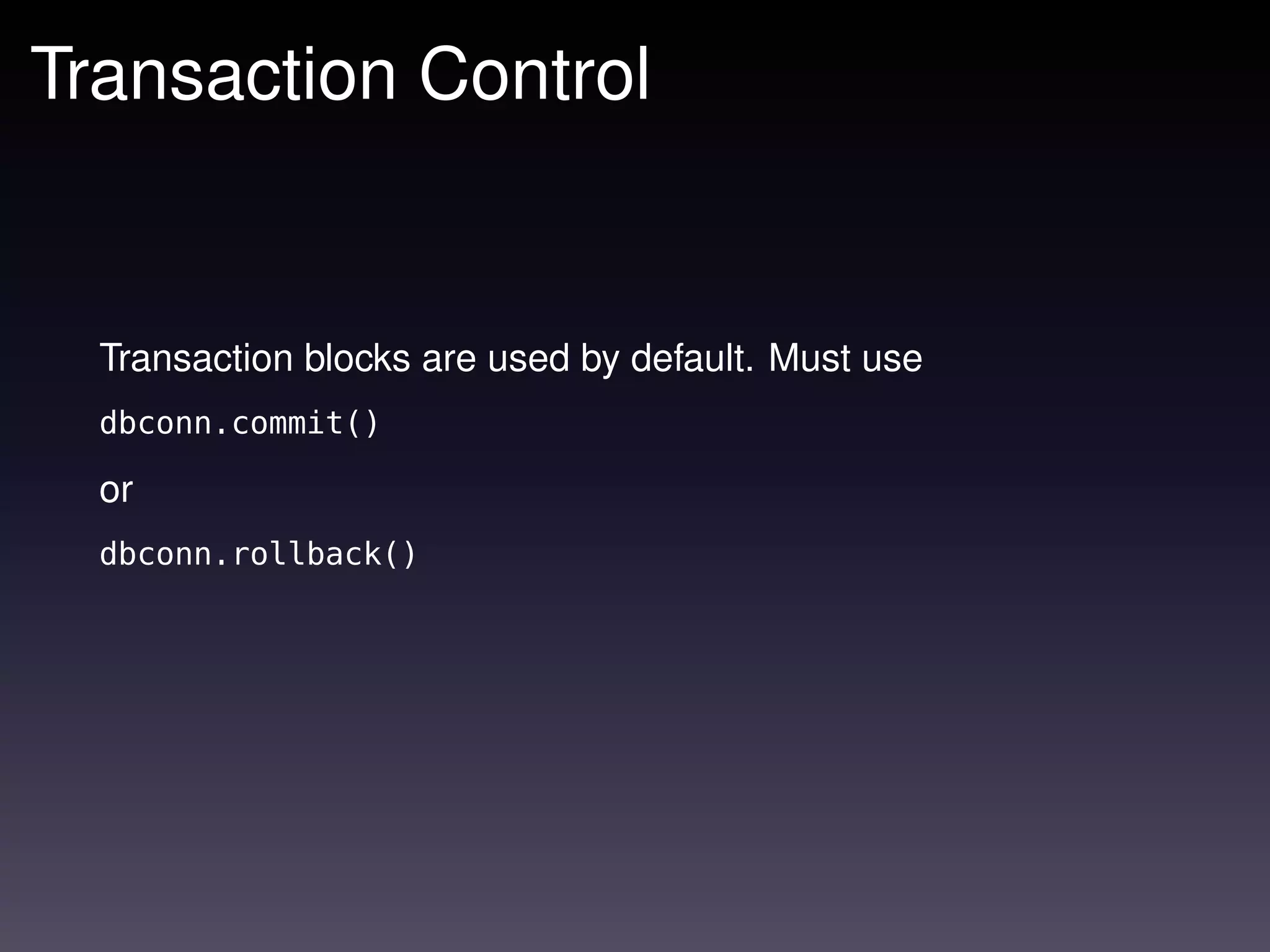
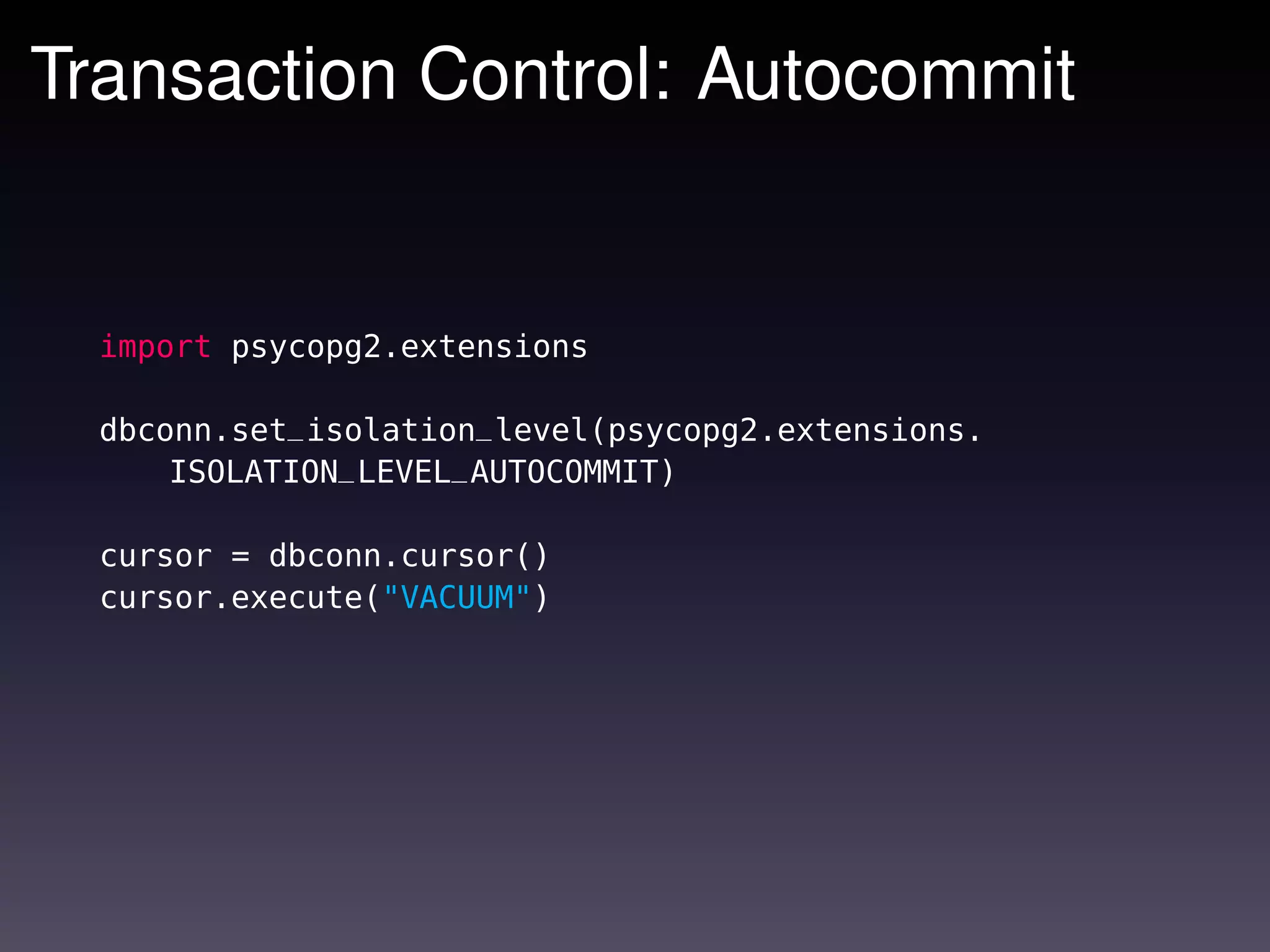
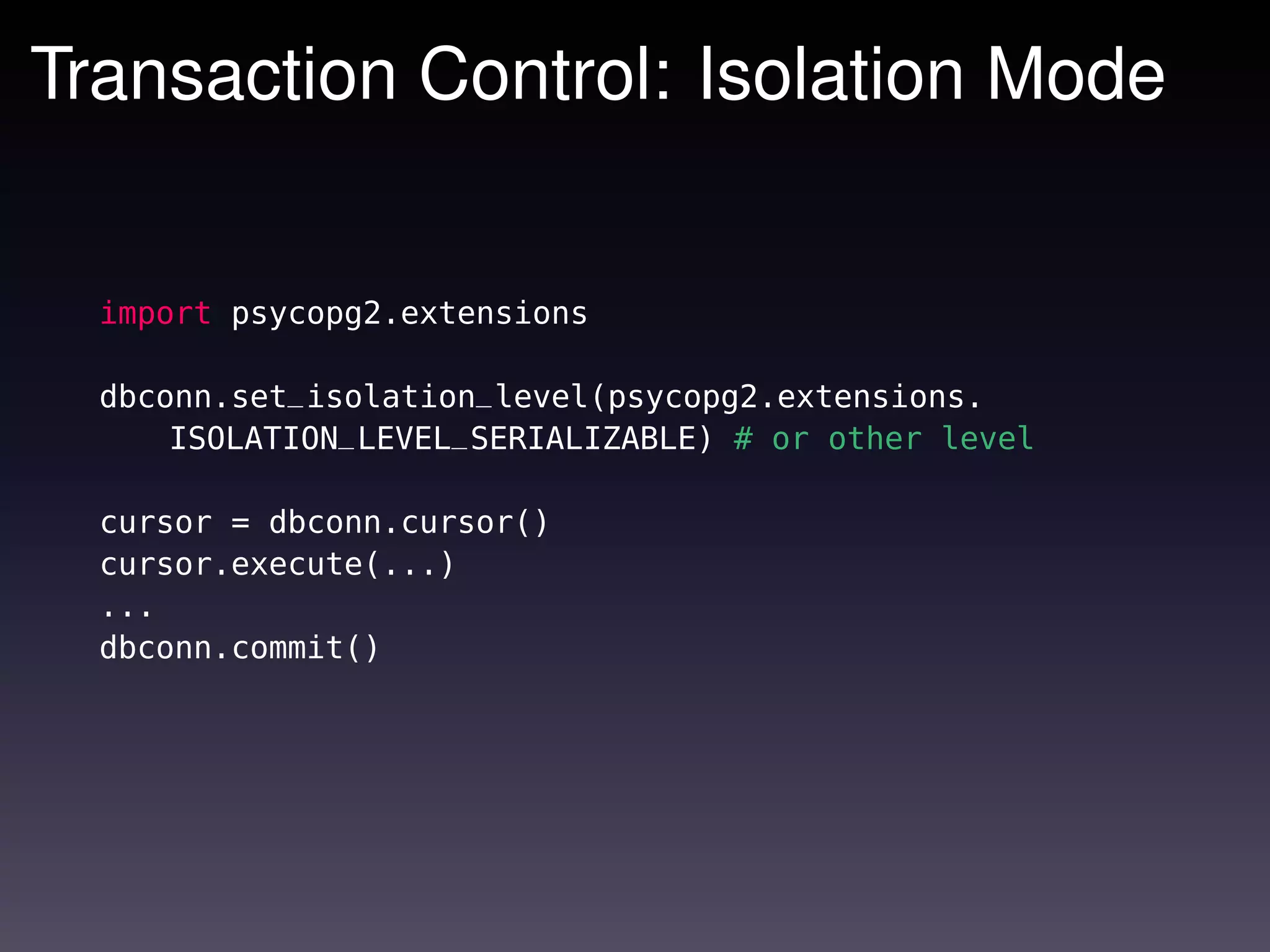
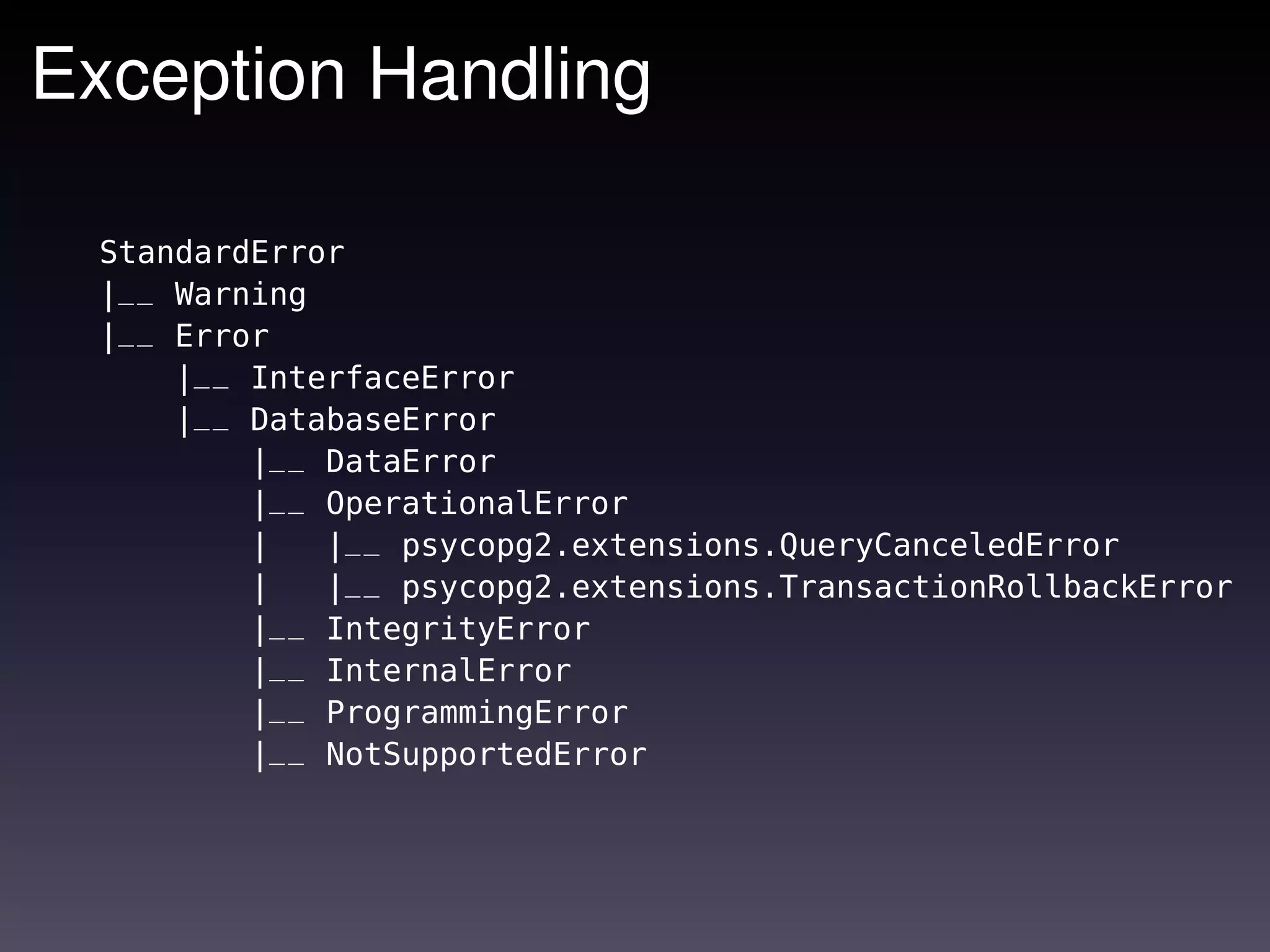
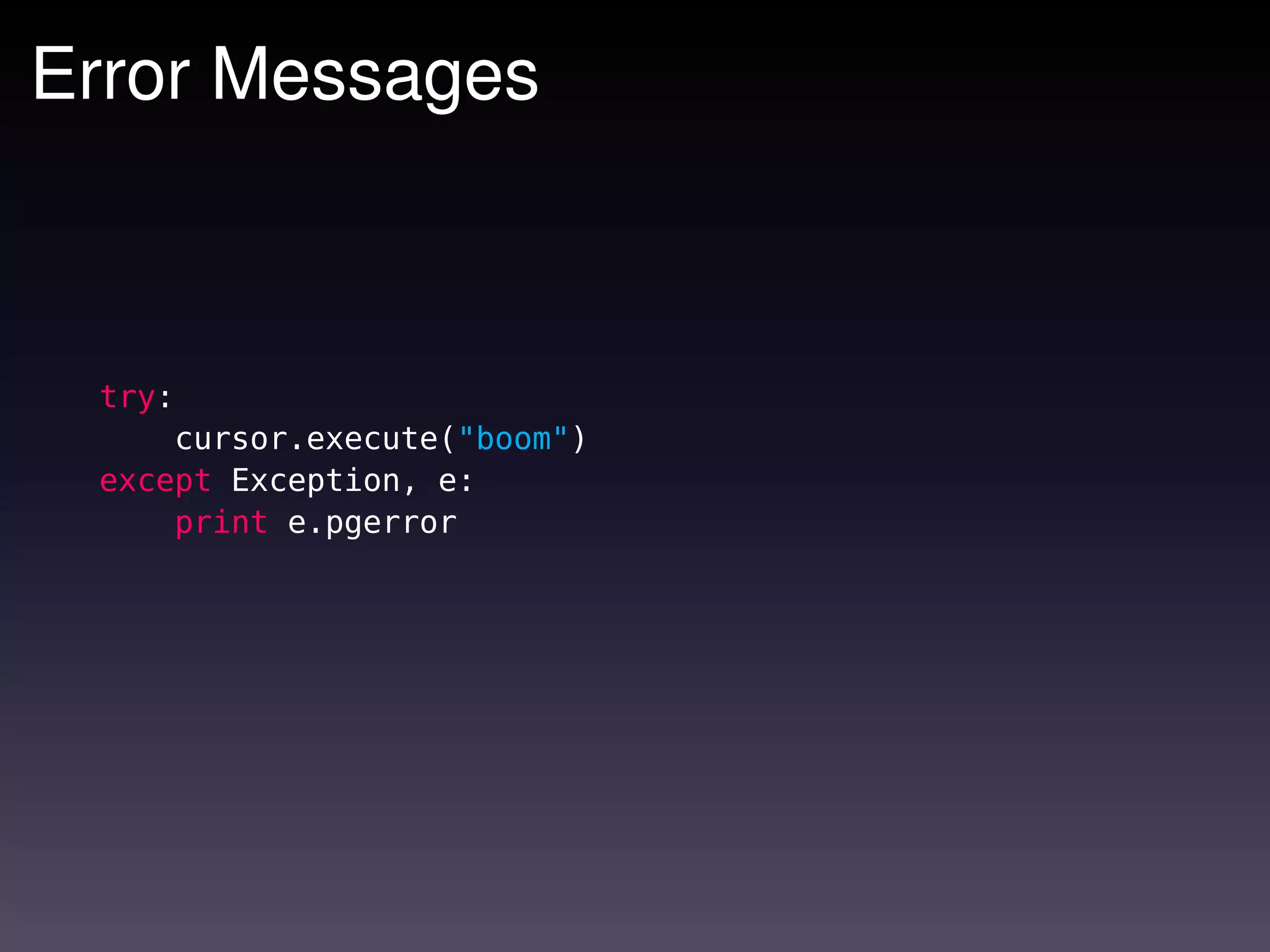
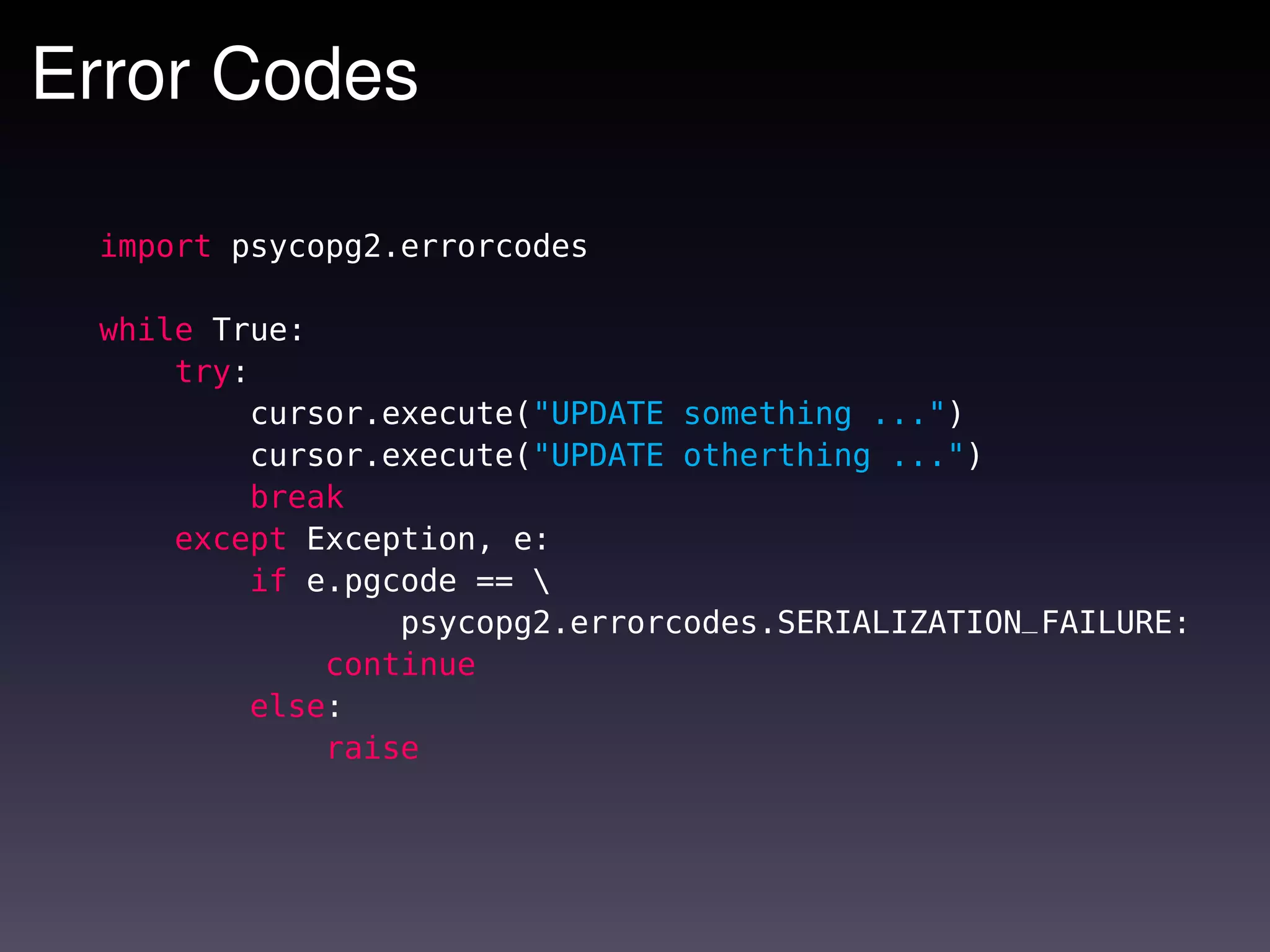
![Connection and Cursor Factories
Want: accessing result columns by name
Recall:
dbconn = psycopg2.connect(dsn='...')
cursor = dbconn.cursor()
cursor.execute("""
SELECT firstname, lastname
FROM customers
ORDER BY 1, 2
LIMIT 10
""")
for row in cursor.fetchall():
print "Name: %s %s" % (row[0], row[1]) # stupid :(](https://image.slidesharecdn.com/python-postgresql-110404144126-phpapp02/75/Programming-with-Python-and-PostgreSQL-54-2048.jpg)
![Connection and Cursor Factories
Solution 1: Using DictConnection:
import psycopg2.extras
dbconn = psycopg2.connect(dsn='...',
connection_factory=psycopg2.extras.DictConnection)
cursor = dbconn.cursor()
cursor.execute("""
SELECT firstname, lastname
FROM customers
ORDER BY 1, 2
LIMIT 10
""")
for row in cursor.fetchall():
print "Name: %s %s" % (row['firstname'], # or row[0]
row['lastname']) # or row[1]](https://image.slidesharecdn.com/python-postgresql-110404144126-phpapp02/75/Programming-with-Python-and-PostgreSQL-55-2048.jpg)
![Connection and Cursor Factories
Solution 2: Using RealDictConnection:
import psycopg2.extras
dbconn = psycopg2.connect(dsn='...',
connection_factory=psycopg2.extras.RealDictConnection)
cursor = dbconn.cursor()
cursor.execute("""
SELECT firstname, lastname
FROM customers
ORDER BY 1, 2
LIMIT 10
""")
for row in cursor.fetchall():
print "Name: %s %s" % (row['firstname'],
row['lastname'])](https://image.slidesharecdn.com/python-postgresql-110404144126-phpapp02/75/Programming-with-Python-and-PostgreSQL-56-2048.jpg)
![Connection and Cursor Factories
Solution 3: Using NamedTupleConnection:
import psycopg2.extras
dbconn = psycopg2.connect(dsn='...',
connection_factory=psycopg2.extras.NamedTupleConnection)
cursor = dbconn.cursor()
cursor.execute("""
SELECT firstname, lastname
FROM customers
ORDER BY 1, 2
LIMIT 10
""")
for row in cursor.fetchall():
print "Name: %s %s" % (row.firstname, # or row[0]
row.lastname) # or row[1]](https://image.slidesharecdn.com/python-postgresql-110404144126-phpapp02/75/Programming-with-Python-and-PostgreSQL-57-2048.jpg)
![Connection and Cursor Factories
Alternative: Using
DictCursor/RealDictCursor/NamedTupleCursor:
import psycopg2.extras
dbconn = psycopg2.connect(dsn='...')
cursor = dbconn.cursor(cursor_factory=psycopg2.extras.
DictCursor/RealDictCursor/NameTupleCursor)
cursor.execute("""
SELECT firstname, lastname
FROM customers
ORDER BY 1, 2
LIMIT 10
""")
for row in cursor.fetchall():
print "Name: %s %s" % (row['firstname'],
row['lastname'])
# (resp. row.firstname, row.lastname)](https://image.slidesharecdn.com/python-postgresql-110404144126-phpapp02/75/Programming-with-Python-and-PostgreSQL-58-2048.jpg)
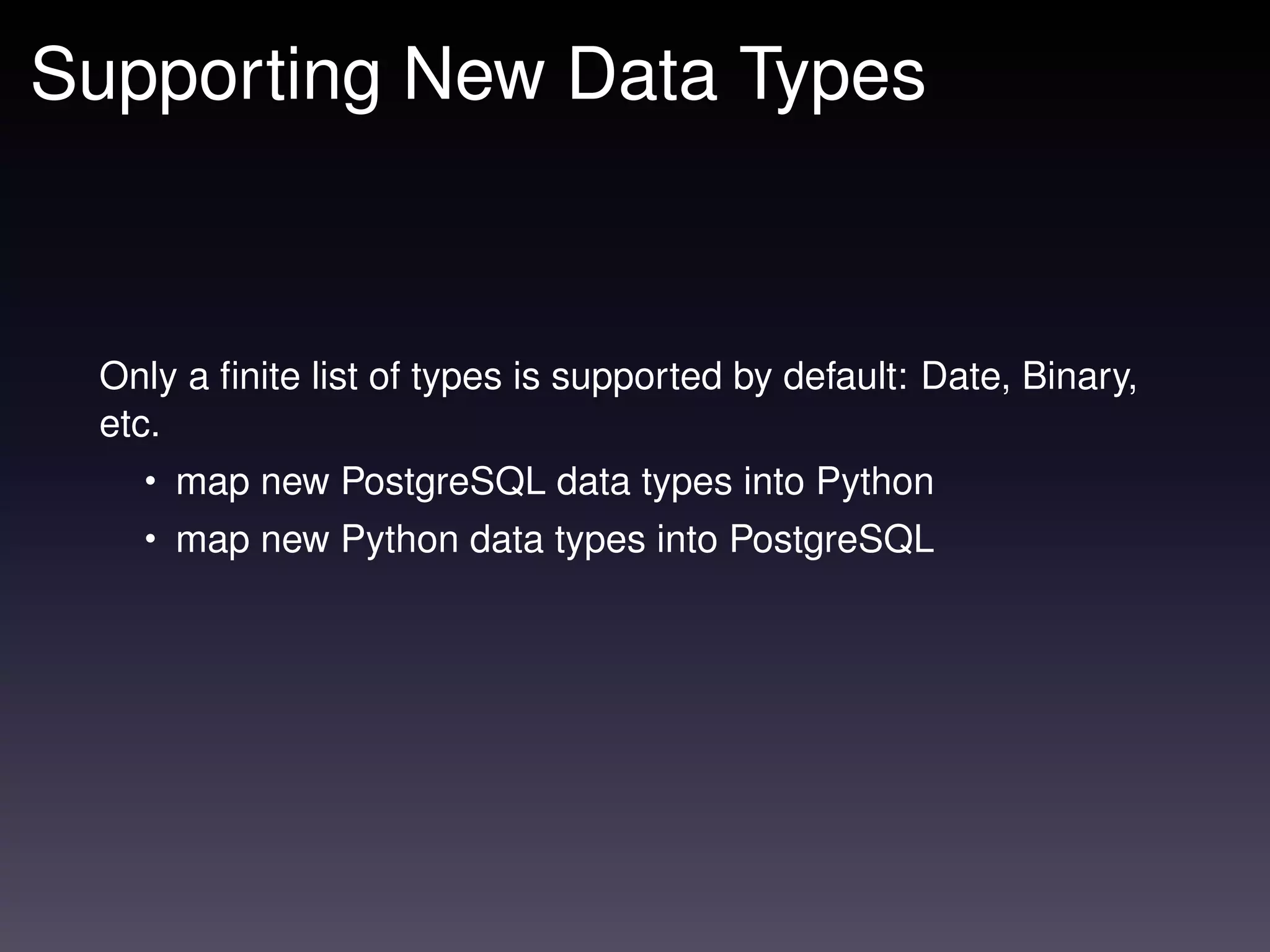
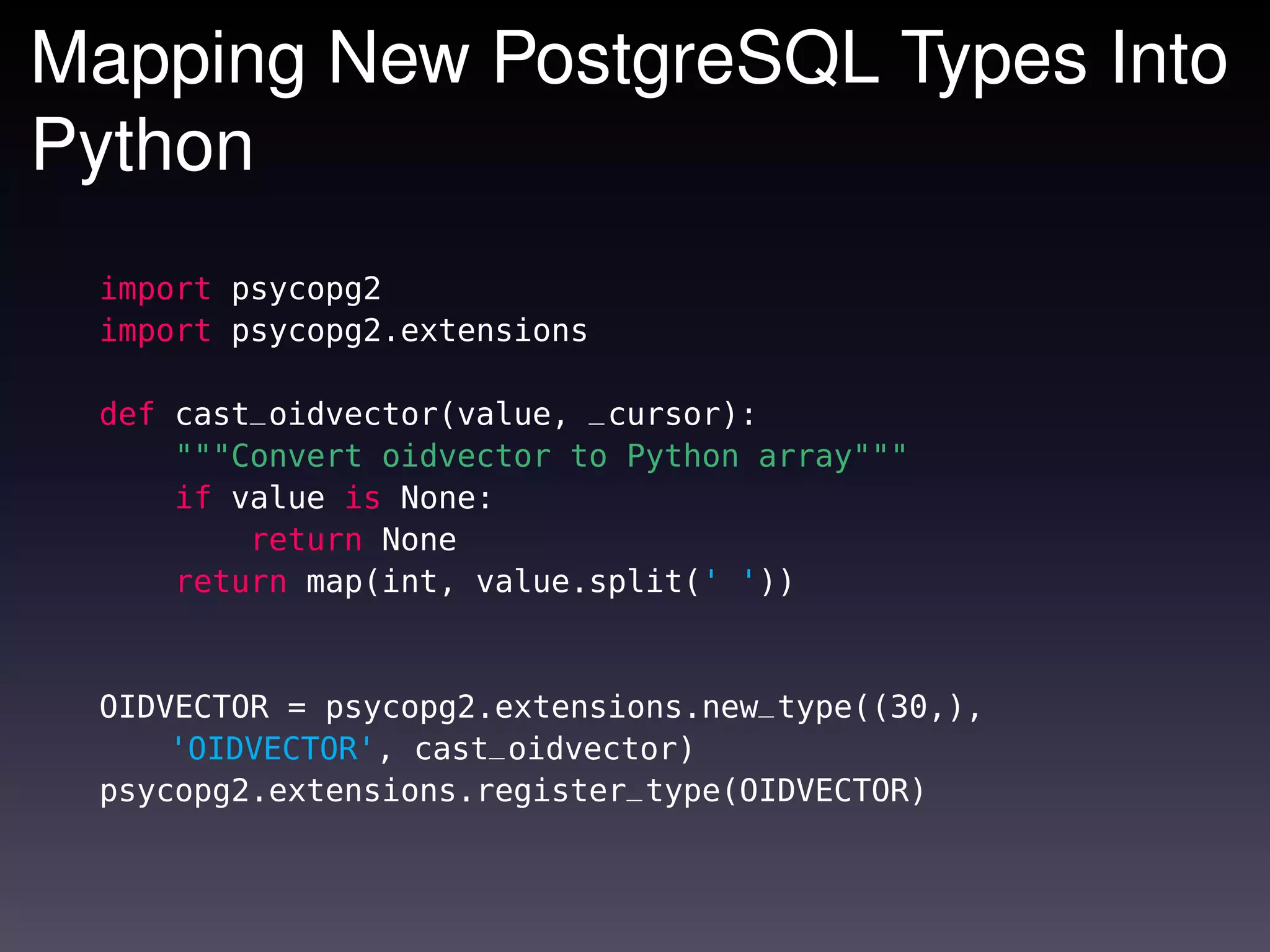
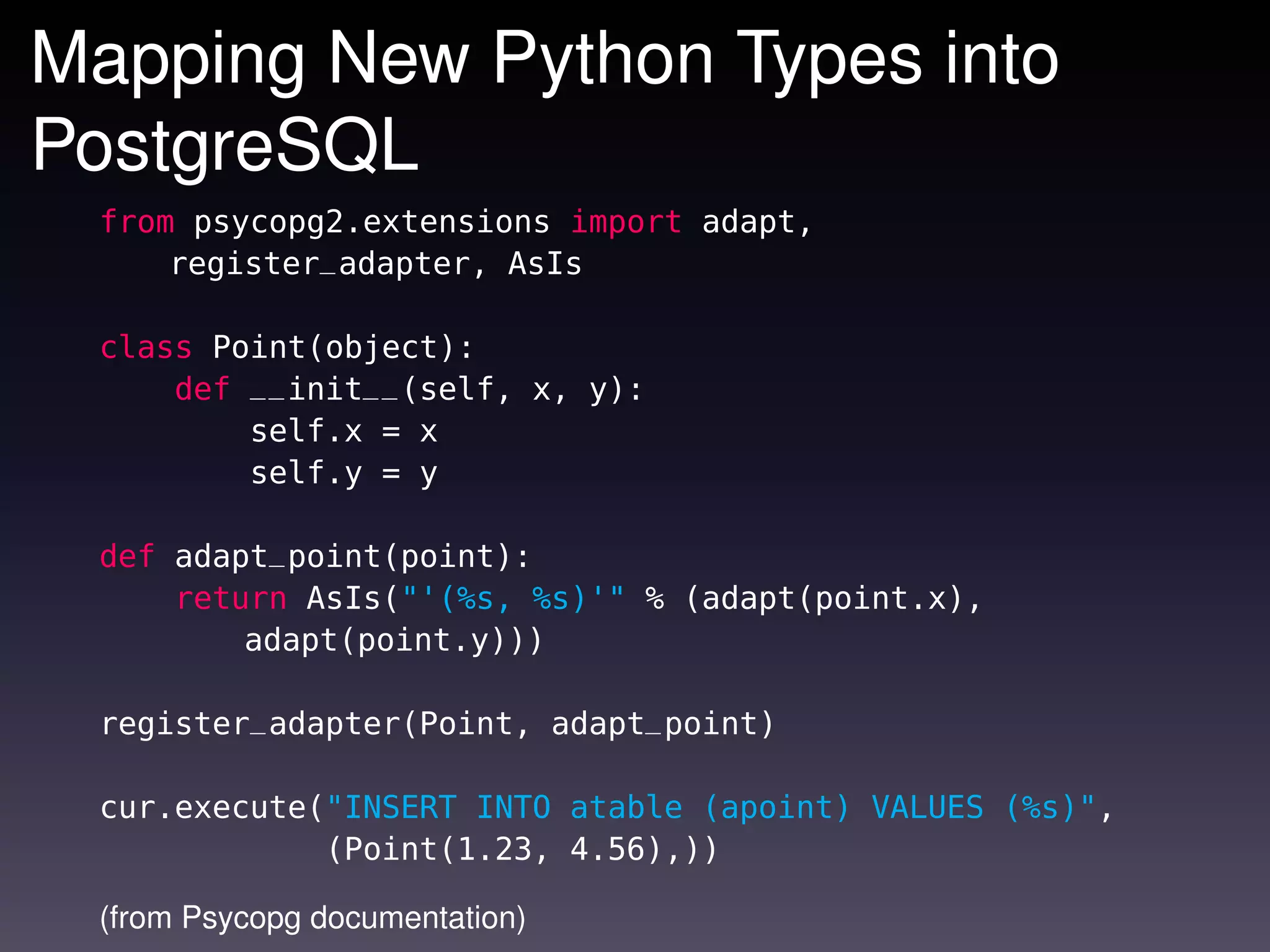
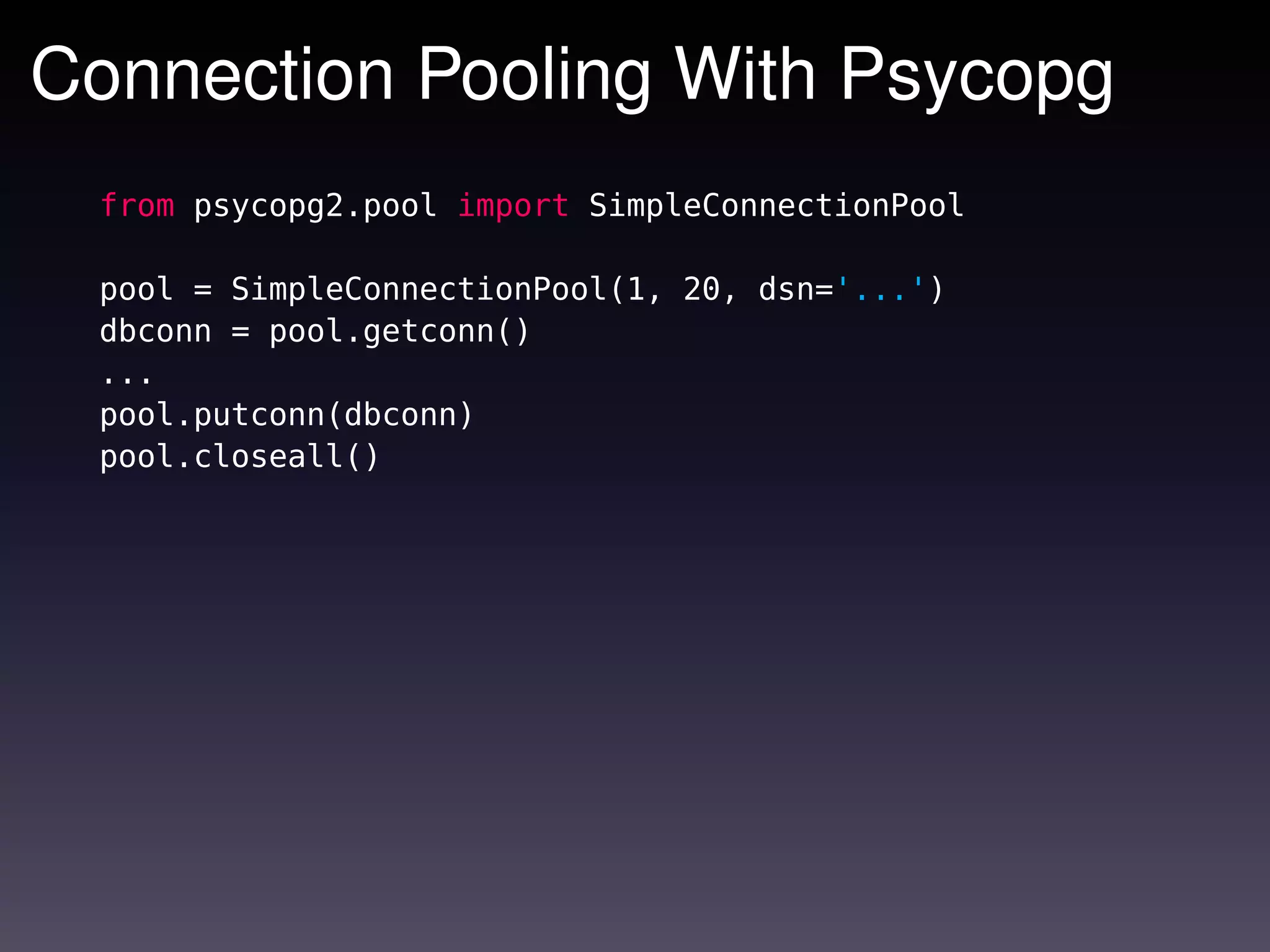
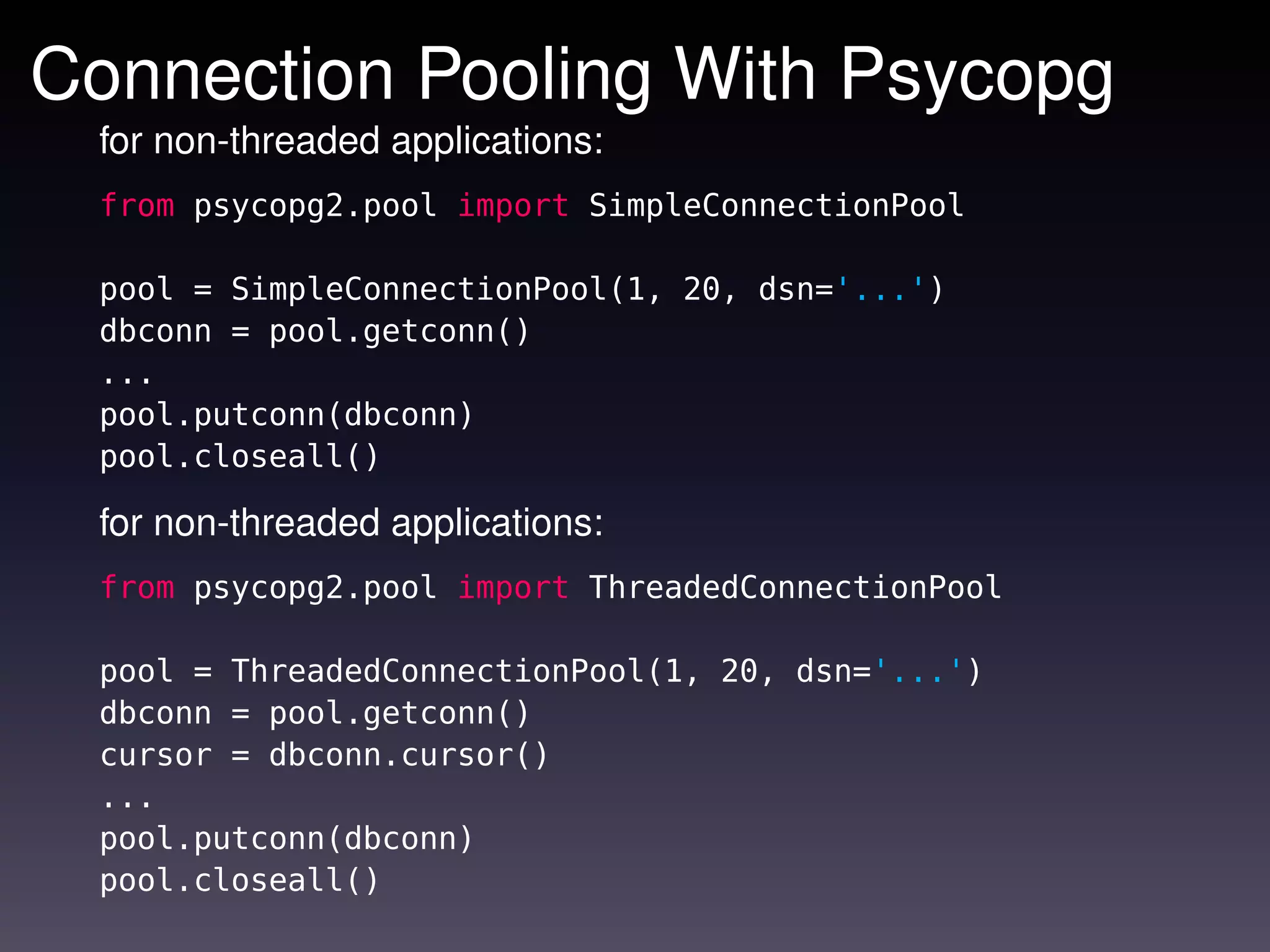
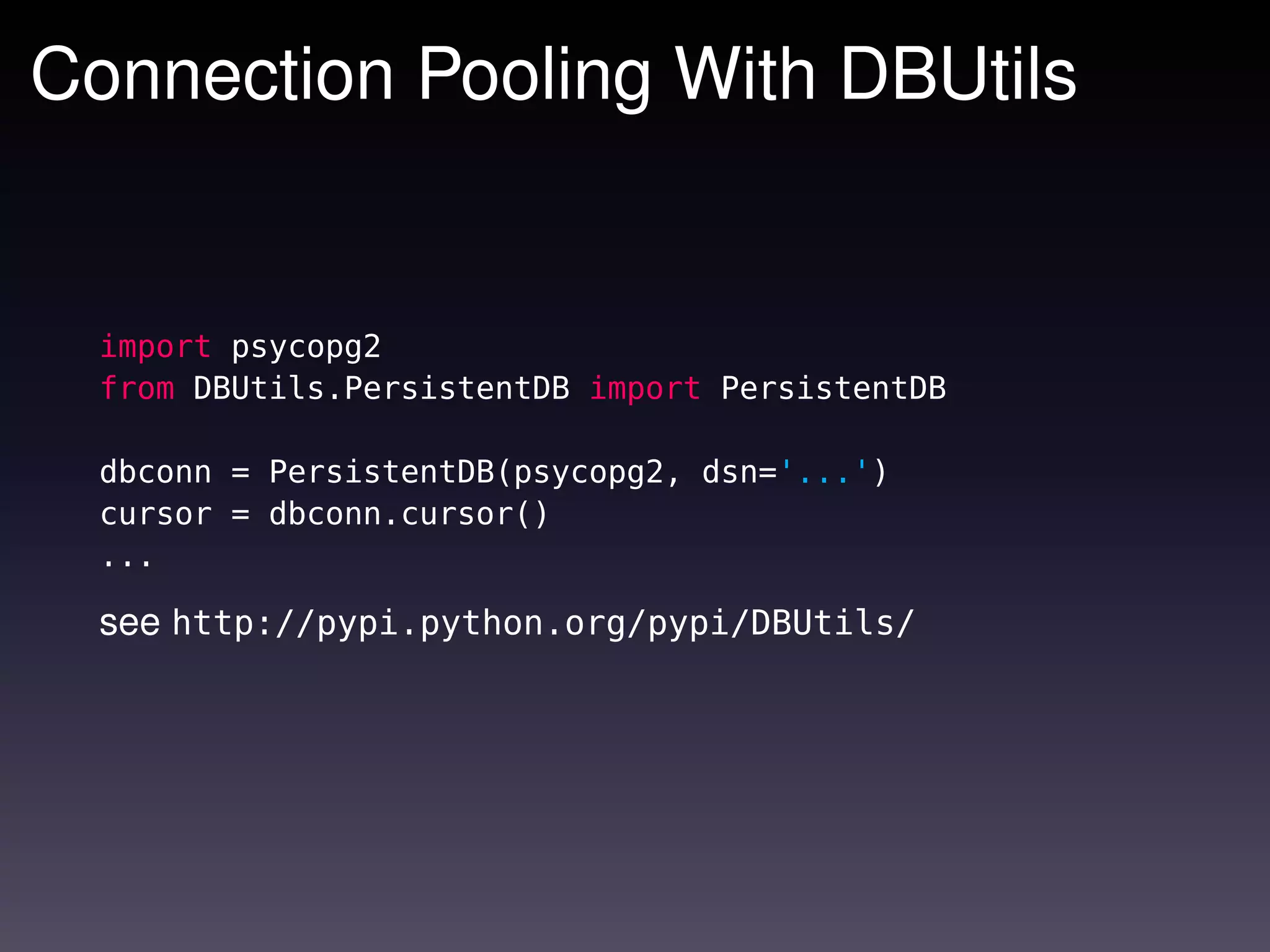
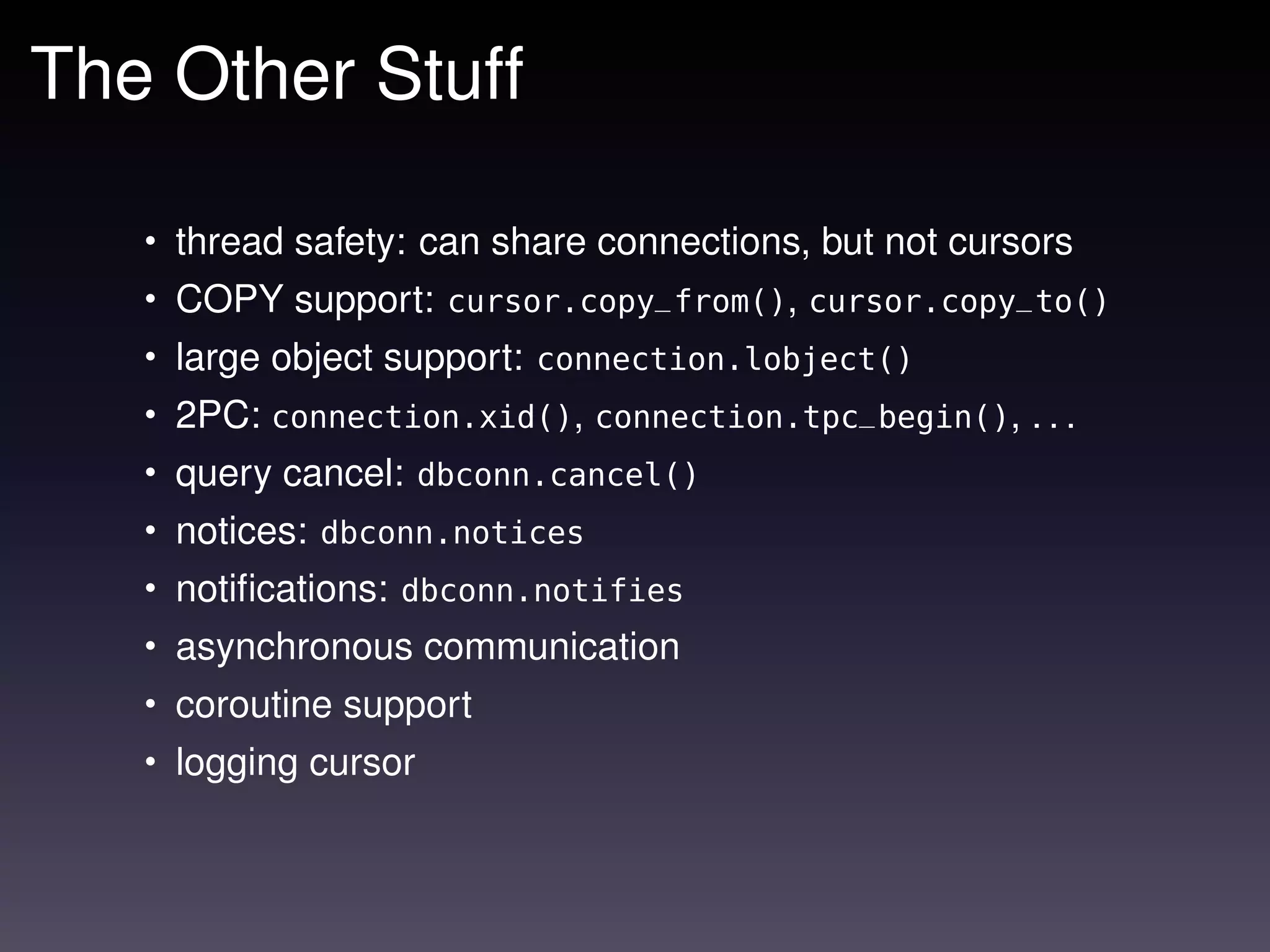
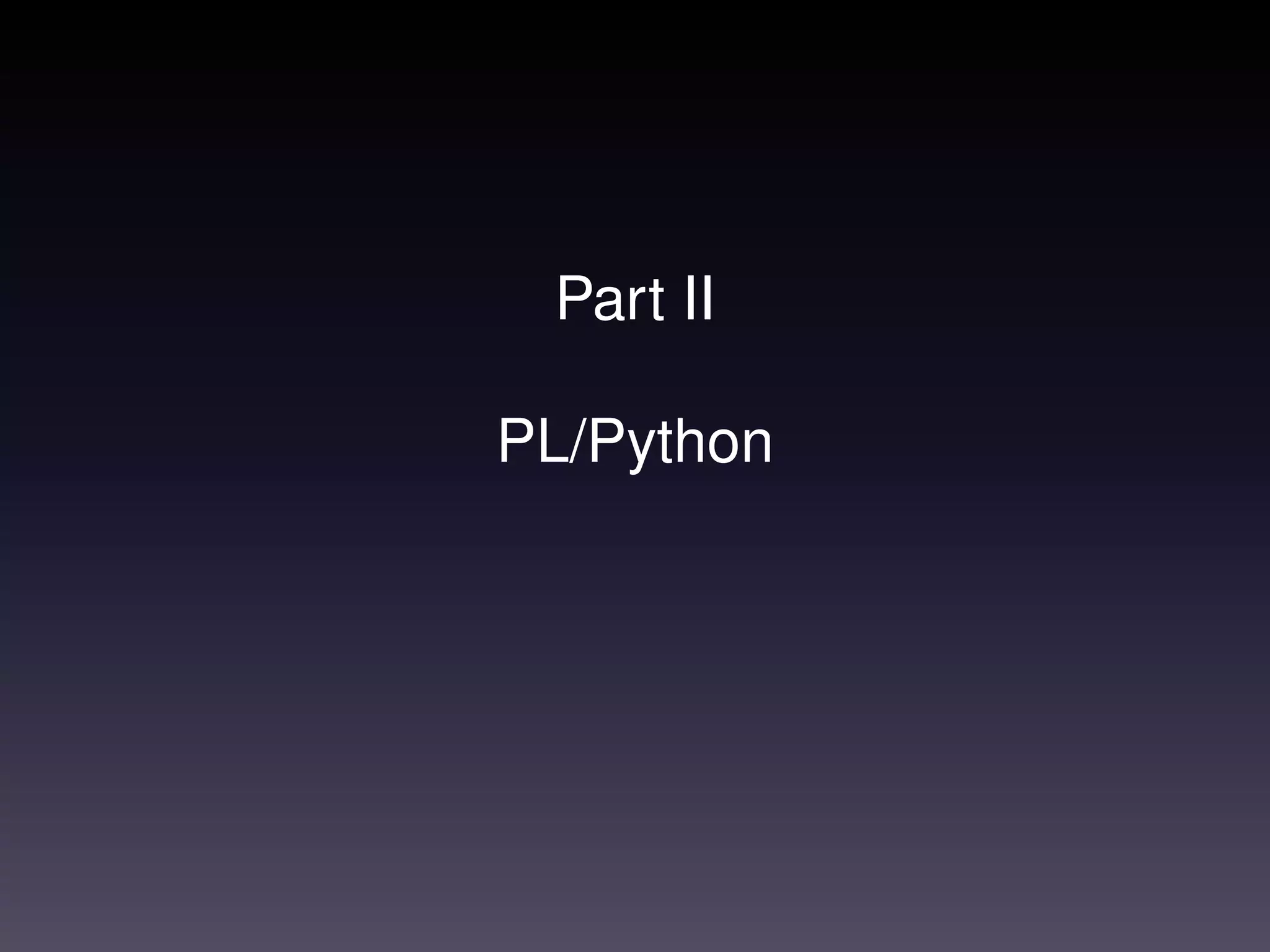
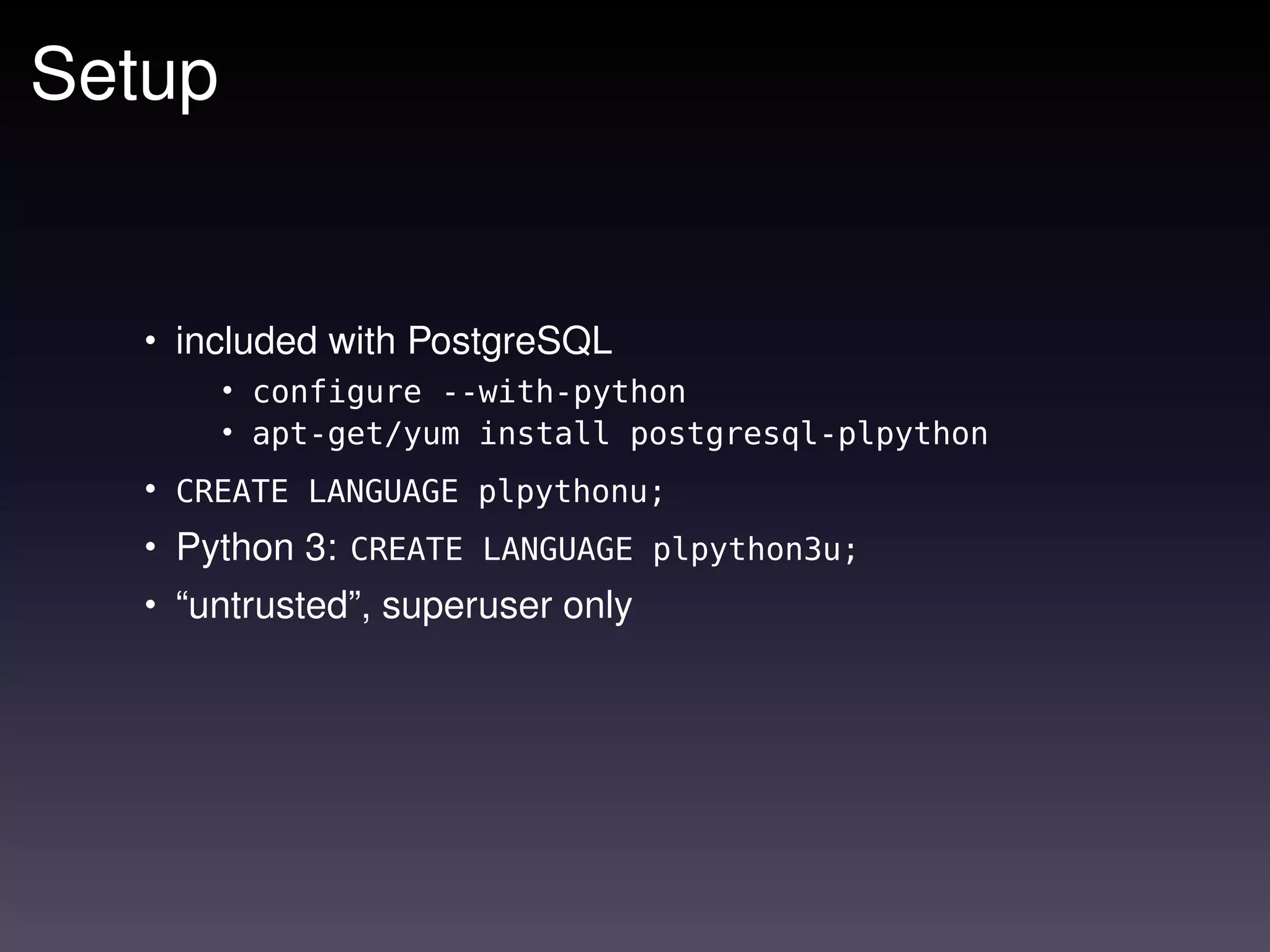
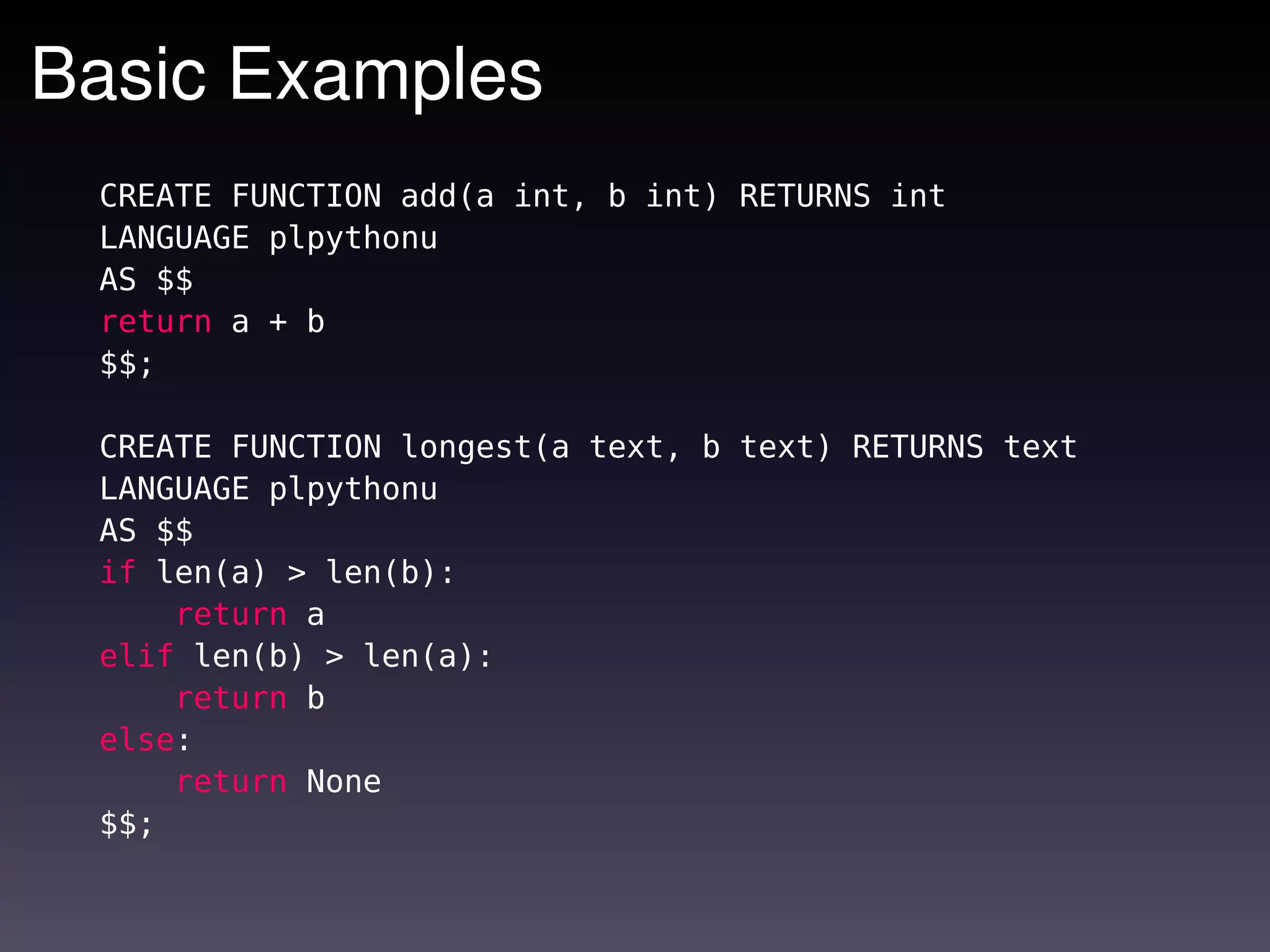
![Using Modules
CREATE FUNCTION json_to_array(j text) RETURNS text[]
LANGUAGE plpythonu
AS $$
import json
return json.loads(j)
$$;](https://image.slidesharecdn.com/python-postgresql-110404144126-phpapp02/75/Programming-with-Python-and-PostgreSQL-69-2048.jpg)
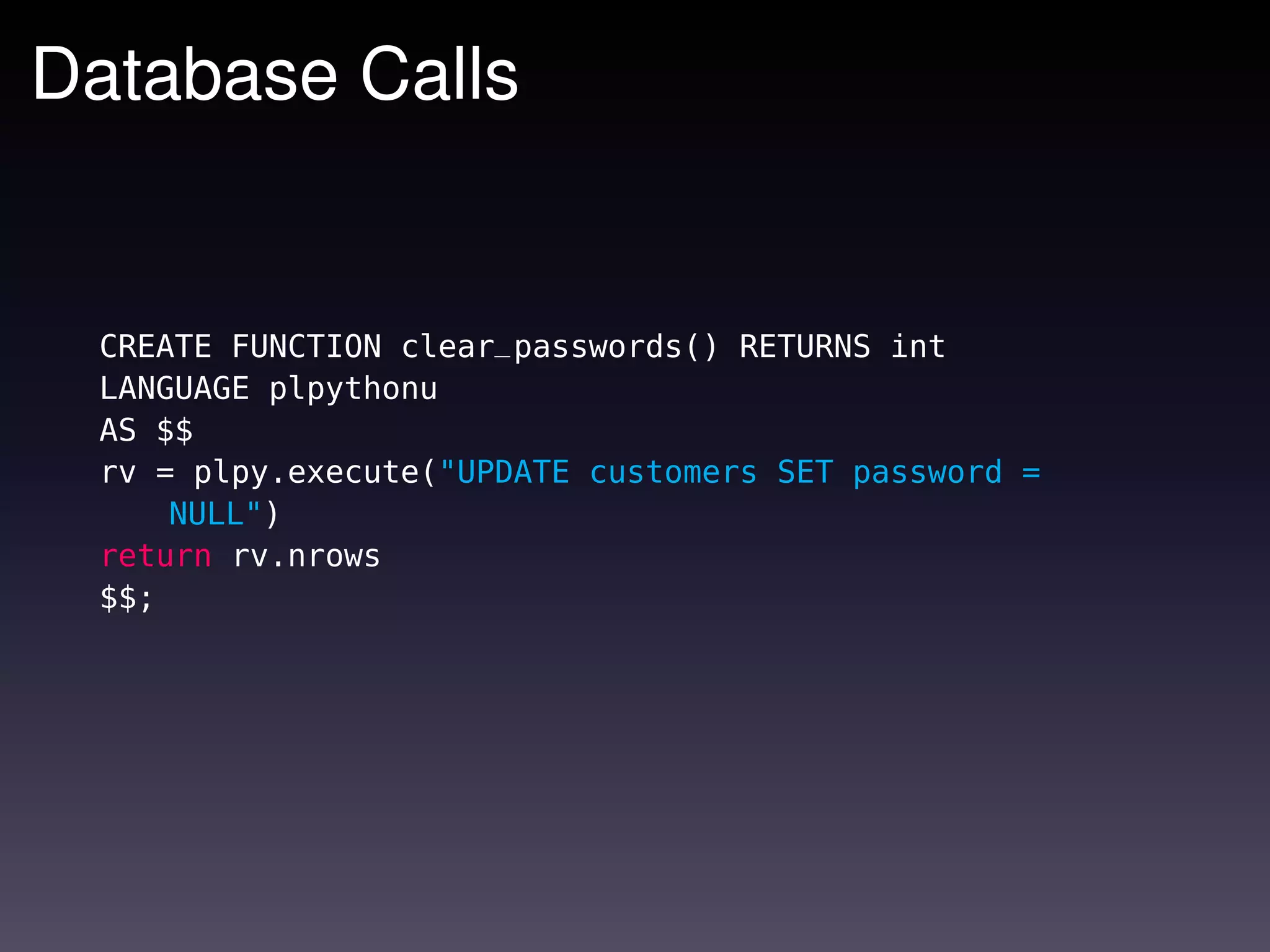
![Database Calls With Parameters
CREATE FUNCTION set_password(username text, password
text) RETURNS boolean
LANGUAGE plpythonu
AS $$
plan = plpy.prepare("UPDATE customers SET password = $1
WHERE username= $2", ['text', 'text'])
rv = plpy.execute(plan, [username, password])
return rv.nrows == 1
$$;](https://image.slidesharecdn.com/python-postgresql-110404144126-phpapp02/75/Programming-with-Python-and-PostgreSQL-71-2048.jpg)
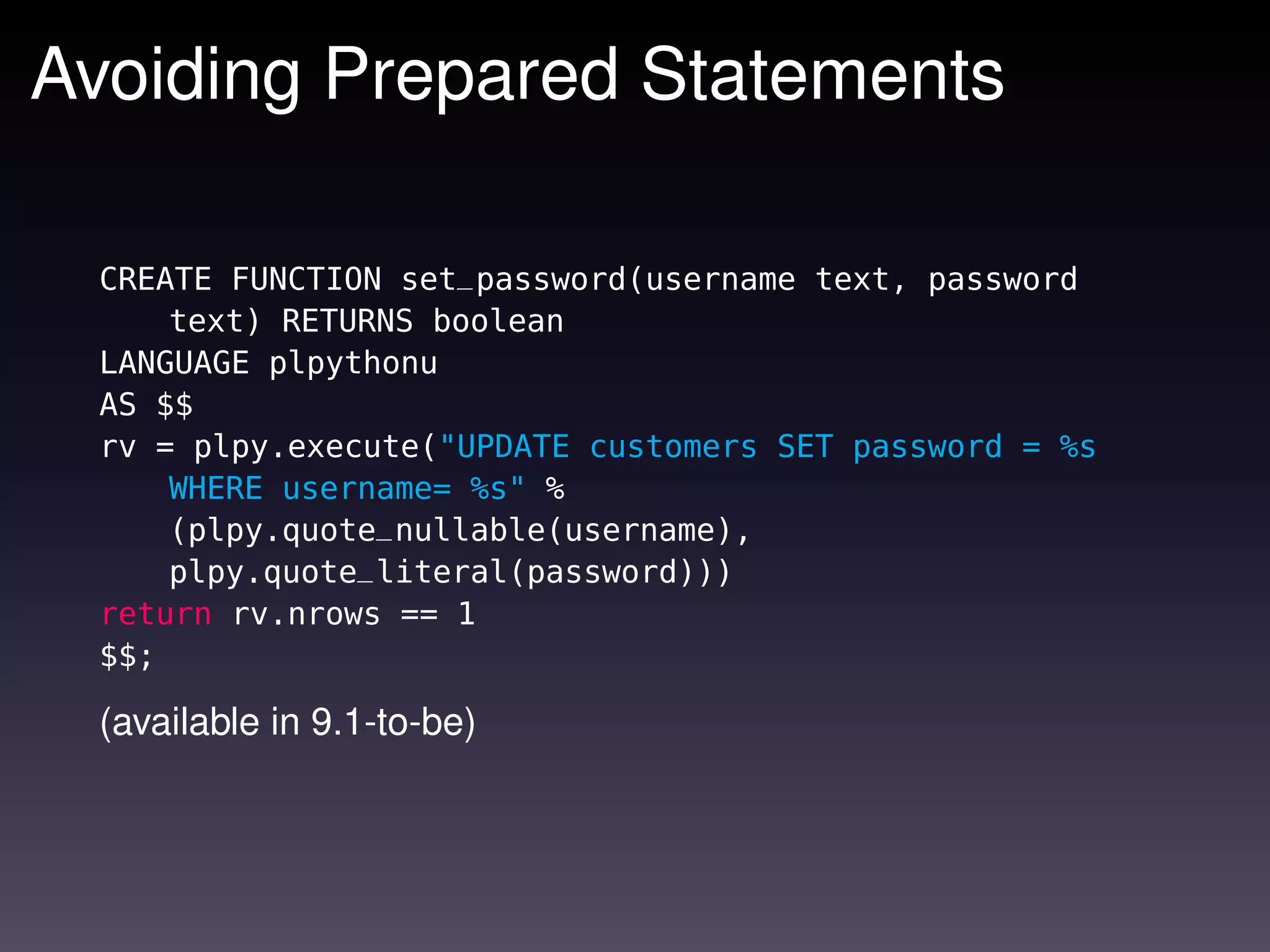
![Caching Plans
CREATE FUNCTION set_password2(username text, password
text) RETURNS boolean
LANGUAGE plpythonu
AS $$
if 'myplan' in SD:
plan = SD['myplan']
else:
plan = plpy.prepare("UPDATE customers SET password
= $1 WHERE username= $2", ['text', 'text'])
SD['myplan'] = plan
rv = plpy.execute(plan, [username, password])
return rv.nrows == 1
$$;](https://image.slidesharecdn.com/python-postgresql-110404144126-phpapp02/75/Programming-with-Python-and-PostgreSQL-73-2048.jpg)
![Processing Query Results
CREATE FUNCTION get_customer_name(username text)
RETURNS boolean
LANGUAGE plpythonu
AS $$
plan = plpy.prepare("SELECT firstname || ' ' ||
lastname AS ""name"" FROM customers WHERE username =
$1", ['text'])
rv = plpy.execute(plan, [username], 1)
return rv[0]['name']
$$;](https://image.slidesharecdn.com/python-postgresql-110404144126-phpapp02/75/Programming-with-Python-and-PostgreSQL-74-2048.jpg)
![Compare: PL/Python vs. DB-API
PL/Python:
plan = plpy.prepare("SELECT ...")
for row in plpy.execute(plan, ...):
plpy.info(row["fieldname"])
DB-API:
dbconn = psycopg2.connect(...)
cursor = dbconn.cursor()
cursor.execute("SELECT ...")
for row in cursor.fetchall() do:
print row[0]](https://image.slidesharecdn.com/python-postgresql-110404144126-phpapp02/75/Programming-with-Python-and-PostgreSQL-75-2048.jpg)
![Set-Returning and Table Functions
CREATE FUNCTION get_customers(id int) RETURNS SETOF
customers
LANGUAGE plpythonu
AS $$
plan = plpy.prepare("SELECT * FROM customers WHERE
customerid = $1", ['int'])
rv = plpy.execute(plan, [id])
return rv
$$;](https://image.slidesharecdn.com/python-postgresql-110404144126-phpapp02/75/Programming-with-Python-and-PostgreSQL-76-2048.jpg)
![Triggers
CREATE FUNCTION delete_notifier() RETURNS trigger
LANGUAGE plpythonu
AS $$
if TD['event'] == 'DELETE':
plpy.notice("one row deleted from table %s" %
TD['table_name'])
$$;
CREATE TRIGGER customers_delete_notifier AFTER DELETE
ON customers FOR EACH ROW EXECUTE PROCEDURE
delete_notifier();](https://image.slidesharecdn.com/python-postgresql-110404144126-phpapp02/75/Programming-with-Python-and-PostgreSQL-77-2048.jpg)
